#Analysis
Explore tagged Tumblr posts
Text
Relevant XKCD: [link]

15K notes
·
View notes
Text
I absolutely adore how this new arc was clearly tailored to put Sebastian to the test. EVERYTHING in the hotel is there to antagonise him in his role as One Hell of a Butler.
The staff? Oh you mean the EXPERTS in tending to the clientele? The ones that are FAR SUPERIOR to a mere servant? Sebastian twitched

But surely even these experts will have their limits, after all they're just humans, unlike Sebastian, right? Well...

Apparently not, the human ability to invent new things to improve our lives got him good.
But not only does the Hotel come for his superior set of skills, it also tries to undermine his pure and pristine "aesthetic as a butler".
A semi suite? For the staff??


His beloved job slandered and filed away as "an inconvenience"??? Preposterous!

And not only is he tested and mocked by the staff at the Hotel, but his very own master decides he couldn't possibly miss this tasty opportunity at rubbing salt in what he knows is an open wound to him. We all know Ciel never fails to tease and wishes to see his perfect butler fail in something just for the heck of it!
The whole situation is putting him under so much stress that he slips up, his eyes change and he himself proposes to just be done with this place already-


And look how disappointed he is in learning that no, they can't simply main and kill and destroy the place, which is extremely funny but let's take a step back for a second and remind ourselves of the fact that Sebastian has always acted as a voice of reason to Ciel



He reminded him that burning the house down and killing all the trapped children was NOT part of their orders from the Queen. He tells the audience that he has no interest in acting like a beast because what he loves is playing his role as Ciel's butler.
Of course he ultimately executes all of his master's orders, but he never proposed a violent course of action himself. This is huge. This Hotel truly pissed him off and quite literally made him see red. All other narrative arcs focused on Ciel but this?
This is personal to Sebastian and it's only getting started.
#genuinely hope it gets worse! i want to see him lose his composure and go crazy! as a treat!#also the bellboy has a haircut that kinda resembles the prim and proper one Ciel's aunt gave him?#sebastian michaelis#kuroshitsuji#sebaciel#<- for containment reasons#analysis#sort of?
270 notes
·
View notes
Text
Playing Fallout 4 on survival difficulty is interesting in that it makes the story significantly better through emergent gameplay. It took me roughly two in-game weeks of scavenging and scrounging every available resource before I was able to get out of Sanctuary alive. My first human contact was with a raider at an unmarked hovel north of the island who sicced a German Shepard on me without warning, and then nothing until Concord. I lost two shootouts with the bloatflies by the bridge. Fighting my way south to Diamond City was a jumpy, touch-and-go odyssey, and I was stuck in Diamond City for easily another three in-game weeks scraping together the resources necessary to punch through to Park Street station. Rinse and repeat for going after Kellogg, for punching through to Goodneighbor, for punching through the glowing sea to find Virgil. I actually had to plan shit out! For everything!
An inability to fast travel and a protagonist made of tissue paper turns every paperthin "moral compromise" present in the base game into a genuine nailbiter simply because you don't have the typical assurance that you'll be able to survive pursuing the dudley-do-right option. Covenant is a pointed example of this; attempting to take a stand against their kidnapping program is genuinely dangerous and impactful in a way it isn't in the base game, since you do it from within the belly of the beast and it converts a badly-needed stopover point into an inconveniently positioned, hard-to-assault nest of gunmen out for your blood. Extensive settlement building with the Minutemen goes from a bizarre, dissonant digression from the significantly more pressing business of finding your son, to a forward-thinking and practical measure taken to facilitate living long enough to find your son. The Brotherhood might be incipient technofeudalists but fuck it if they don't provide on-call airlifts. The Institute might be a totalitarian technocracy with a slave-based internal economy but they've got teleporters, running water, and if you threw in with them you'd never have to deal with any of this bullshit on the surface ever again. All of that's true in the base game, from a thematic perspective, but Survival mode makes you feel it. Finally, I understand the convention of NPCs farming out even the most basic fetch quests to the player; you're experiencing what the narrative has always been claiming would happen if they tried to do any of this themselves.
214 notes
·
View notes
Text
To the separated mind, the gods appear terrifying: they arrive as fate, as obsession, as punishment. They move beyond the reach of the will, acting through dream, through compulsion, through suffering. We fear them because they seem other, and so we name them: war god, love goddess, underworld keeper. We build temples not to worship, but to negotiate. Please, don’t destroy me. Please, don’t possess me.
But when the inner world begins to open through self-inquiry, rupture, or devotion, we realize the gods were never separate. They are not outside of us. They were the unacceptable desires, the unbearable instincts, the divine chaos we refused to integrate. The moment we turn inward and name them as our own, yes, I am the god of wrath, of lust, of sacrifice, they lose their threat. They become allies. They become organs of the psyche. And the fear dissolves into power.
Hannibal as the god of death, of manipulation, seduction, the forbidden, moves in the shadows of Will’s mind, shaping him, haunting him, violating his moral structure. And Will resists not because he doesn’t desire, but because the desire terrifies him. To love Hannibal would be to surrender to a part of himself he has never claimed. A part that kills, that craves, that knows.
But Hannibal is no more external than the gods of old. He is a mirror. A calling. The ritual madness that forces Will to confront the violence, the eros, the omniscience within himself. And as Will stops resisting, as he lets go of his human moralism and steps into the myth, they merge. Not as a couple, but as a single intelligence, a godform, indivisible. The hunter and the hunted, the empath and the predator, the sacrificial lamb and the priest. The line between them ceases to exist.
What once was feared as separate is now understood as the self. And the punishment was never real...it was the resistance. The horror of becoming what we already are.
#nbc hannibal#musings#hannigram#will graham#hannibal lecter#hannibal analysis#analysis#hannibal meta#meta
69 notes
·
View notes
Text
True.
My 30-something wisdom is that your palate is constantly changing so don't assume because you hated a food 10 or 20 years ago you still will. Most radically, your taste as a little kid is not indicative of what it will be as an adult-- I've known too many adults who still refuse to eat anything but chicken strips and ketchup because they're still basing their taste on what they experienced at 8 years old and so have cut themselves off from the entire world of adult taste. In my case, my taste for savory foods, especially vegetable dishes, "bitter" foods, and more complex flavor combinations has really expanded. I didn't like mushrooms as a child or for most of my 20s, but around 28 suddenly they worked for me. I started enjoying dark chocolate around 25, especially paired with fruit flavors. I've never been hugely fond of eggplant but discovered that in a sauce or roasted in butter and oil its delicious. I've always enjoyed fish but in the last 15 years I've discovered a passion for it, salmon especially. I've learned to recognize the tastes of herbs and love putting them into everything I can (currently I'm most enthusiastic about dill.) I'm also suddenly crazy about all kinds of sandwiches. And I'm still trying olives every couple years in case suddenly they start working for me, though sadly no luck on that front yet. So basically, expect that your taste is going to change in adulthood and expect that it will keep changing. And you can also work to develop your palate by exposing yourself to new flavors and combinations and cuisines, opening you up to even more foods you might never have liked before. So keep trying new and old foods, because you never know when you might suddenly start liking something new or discover a new way it can be prepared or a new texture it can come in. Don't wind up imprisoned in a world of chicken strips just because you haven't tried anything else since 3rd grade, you deserve better.
13K notes
·
View notes
Text

This motherfucker... honest to god, Sinners already had a powerful cast (Looking at Miles Caton, Michael B Jordan, and Haliee Statenfield's characters specifically), some phenomenal songs, and in some areas you could definitely see this as a story that could exist without the vampires. Then this bastard arrives at the beginning of the second act.
Remmick earns his status as the films villain, not only being the monster that was attracted to Sammie's generational music, but by also being something much more horrific and multifaceted. He's a butcher, a killer, wherever he goes death is sure to follow be it at his hands or just the hands of the clock. He quite literally is the living dead, which is what he considers to be the purest form of freedom possible. Yet even he desires a twisted sense of community.
Before he became a vampire, Remmick was an Irishman who was alive when the "Christians were taking the land" and not only does he outright mention this, but sings about Dublin for gods sake! So he goes to the Joint not just to feed, but to add to his "community," his hive. He is guaranteed some things due to his skin, as shown when a racist white family lets him into their home before he turns them, but he's the furthest thing from a bigot imaginable. He simply wants others to revel in this living death as he does and skin color is not a factor, only their connection and undying loyalty to his "community."
In short I am impressed by how Ryan Coogler made such an undeniably horrific yet multifaceted vampire who enjoys in what he is and fits into the story. Hope I explained this properly, I did see only see the film yesterday and I'm still processing a lot of it.
87 notes
·
View notes
Text
Maturing is realizing the darkling was right…

When people talk about the Darkling, they usually jump straight to the worst parts: the Fold, the manipulation, the power plays…
But if you actually slow down and look at Aleksander Morozova — the real man behind the myth — things aren’t as black and white as they seem. If anything, once you understand what he was up against, it’s hard not to admit that, yes, the Darkling was bloody right.
First off, the Grisha weren’t just living peacefully in Ravka. They were soldiers. Tools. Everywhere else ( Fjerda, Shu Han, Kerch ) they were slaves, test subjects, or executed on sight. The world hated Grisha for what they were, not what they did.
Aleksander grew up seeing that.
He wasn’t someone who just “wanted power for power’s sake” — he wanted to build a world where Grisha didn’t have to live in fear of being burned at the stake or locked in a cage for existing.
And something a lot of people don’t talk about enough is how realistic Aleksander’s mindset was. The man lived for hundreds of years. Watching history repeat itself. Watching Grisha get slaughtered over and over again. Watching kings promise change and then stab them in the back.
Of course he snapped. Of course he stopped believing in “being good” for the sake of it.
How many lifetimes can you live watching people you love die before you realize being “good” means nothing if you’re powerless?
Honestly, I wish Bardugo had explored that more : the mental cost of immortality.
Because it explains soooo much about him.
He wasn’t some cartoon villain twirling a mustache.
He was exhausted. He was furious.
He had lived too long to keep pretending that hope alone could save anyone.
When he created the Fold, yeah, it was a mistake. No one’s arguing that summoning a nightmare wasteland was good. But what people miss is why he did it. He was trying to create a weapon strong enough to force the world to respect the Grisha. The Fold was meant to protect them.
It got out of control, sure, but Aleksander kept fighting to find a solution, even as the world twisted the story and made him the monster.
What makes it even sadder is that he knew kindness wasn’t going to save anyone.
Hope wasn’t going to stop armies from marching.
Diplomacy wasn’t going to stop Grisha from getting hunted down in secret.
He understood something the others refused to face: survival in their world was going to require fear. Without it, Grisha would never be free — just tolerated until the next convenient purge.
Even when you look at Alina’s story ; what happens after the Darkling dies? Ravka stays broken. The Grisha lose their organized army. Their future? Uncertain.
Aleksander’s death didn’t solve the world’s hate.
It didn’t create peace. It just left the Grisha weaker, and more vulnerable, without anyone strong enough to defend them.
If you really think about it, Aleksander wasn’t the villain in his own story. He was the only one who truly understood the game they were playing and he was willing to make himself the villain if it meant the Grisha could live. He carried all that hatred, all that loneliness, and kept going anyway.
For them.
He’s one of those characters who’s not “good” or “bad” he’s … necessary.
He wasn’t perfect. He wasn’t gentle. But he wasn’t wrong.
And honestly?
The world he was fighting for would’ve been safer for Grisha than the one they ended up with.
Aleksander Morozova wasn’t just right.
He was the only one willing to do what was necessary when everyone else was too scared or too naive to see what it would cost.

65 notes
·
View notes
Text
What is Zym's Purpose?
Zym is one of both the most and least interesting characters in The Dragon Prince.
While he is the titular character, in the first three seasons he is mostly a frightened, occasionally helpful plot device, if not outright macguffin for the heroes to escort and protect. In arc 2, he's more along for the ride and his relationship with his mother gets more development, with him playing more of a role in season 4 and season 7, but beyond that Zym doesn't impact the plot too much more, and usually serves as a support / way to develop Ezran further.
This is understandable for a few reasons. In arc 1, Zym was barely a few weeks old, and in arc 2, he's often times facing problems that require different skills than the ones he has on hand. The fact that he couldn't communicate directly with anyone outside of Ezran and Zubeia also hampered his ability to develop. The fact he can now talk (and is voiced by Dante Basco) as of the end of S7, in addition to being the Last Archdragon and new King of the Dragons, have all greatly subsequently elevated his role and importance. It seems likely that arc 3 will be "The Dragon King: The Return of Aaravos" after all.
But... what exactly is Zym's role in TDP, from both an in-universe perspective (i.e. what Aaravos and/or others) expects of him, and from an overarching narrative lens?
Well... let's get into it.
Weird Narrative Setup Shenanigans
To begin, I'm going to start with what Aaravos thinks, or seems to think, of Zym, because there's weird narrative setup in arc 1 compared to arc 2 that I think retroactively make sense. What do I mean by weird? Well...
As Aaravos lays out in 3x07, Zym is of the utmost importance to 'their' plans:
VIREN: So what is the plan? AARAVOS: To fulfil your wishes, of course. [...] And this bright future will require us to conquer Xadia? VIREN: Yes. Yes, perhaps. AARAVOS: The key to achieving your noble aims for humanity is simple.


AARAVOS: Yes. You must take down the Dragon Queen, and capture the baby dragon. Then you will have the attention of all the world, and the power to do what you want.
It's... a little vague, but we know the draconic royal family at this point is Important, and that Zym is accordingly the hope of healing the rift between humans and Xadia, as Rayla says "it could change the world" in 1x06. So Aaravos and Viren assigning similar importance — whatever happens, or is done to Zym, having an impact on The World — isn't out of line.
(It does, however, represent how Aaravos has framed things to validation seeking Viren — "Then we will have to get [the Pentarchy's] 'attention'" in 2x09 with the smoke assassination scheme — but also Aaravos in 7x08 to the stars: "Are you watching?" Do I have your attention?)
Aaravos gets a little more specific in 3x09:
AARAVOS: When you capture the dragonling, I will show you how to take his power, how to imbue yourself with all his magic and potential, so that you will transcend the limits of your human form. Then none will dare stand against you.
Viren asks disturbingly few questions about this, and given that we don't get to see the spell come to fruition, we don't exactly know what he means. However, there are some things we can pull from:
In 3x07 (and again in 6x08) Aaravos is able to possess, control, and tether his energy to Pharos' body, speaking freely through and entirely controlling him. (He does the same with Sir Sparklepuff in 5x09 and with a smaller version of himself in S7, stating "this body is a Vessel".) While these possessions seem temporary, he implies that he can control Callum indefinitely post re-corruption in 7x09.
The spell he uses to consume Zym is channelled through the Staff of Ziard (which was also required to free Sir Sparklepuff, and has a quasar diamond in it) and has some interesting incantations, to say the least: "I swallow your heart, I swallow your mind, I swallow your power" (sometimes with one of these, such as in TOX, being switched out for "I swallow your soul").

We also see a similar idea of imbuing take place in 3x07 with the 'gift' hearts of cinder spell: Viren says he will inoculate his armies with great power, so that the dragons cannot strike them down with fire. So we have one spell already on hand, that Viren purposefully passed on, in making himself (temporarily) immune to enemy dragon fire. So whatever the endgame plan for Zym was, it'd make Viren even more powerful than that.
Moreover, given that Aaravos' first goal in the series was to get out of the prison, it is possible that the intention was to use Zym to combine with Viren, and make himself a new body. However, this runs into two potential problems:
If Aaravos' spirit could be distilled in that manner, Sir Sparklepuff + the quasar diamond could've been used from the start to give him a new body. The prison and locating his specific soul was therefore a necessary step still not covered in S3.
Regardless of the manner the quasar diamond is used for, and how much that person may want it to work (Claudia in 6x08), love is still a necessary ingredient for the spell with the diamond to function (as are the other physical properties).
Now, it is possible that Zym being an archdragon could override certain things (their bite can destroy a Startouch elf's mortal vessel after all, which is undeniably OP) and that Zym in particular is a Weird Archdragon (more on that later). "Transcending the limits of your human form" could very well mean becoming a suitable permanent body host for Aaravos in ways that possession just wouldn't suffice for.
But "then none will stand against you" makes me think otherwise, precisely because who is included in those 'none'? Aaravos has already heard the story of how Viren took down Avizandum, "the most powerful creature in the world" (even if Aaravos is definitely stroking Viren's ego with some of that one). Zubeia is in a coma and the other Archdragons are MIA; the Sunfire stronghold just fell; who is left to seriously stand against? Well...

But how does Zym + Viren (or Staff) = power to stand against the Cosmic Council? Well, it comes down to what I think Aaravos' endgame is with Zym, in some ways, which is:
A Weapon of Vengeance (In Theory)
Zym being a weapon is one of the first things we see the series refer to him as, and his duality—partially shared with dragons as a whole—between a weapon vs a child/baby, or a god vs a person, is present throughout.
AARAVOS: Avizandum was no person. Avizandum was the great King of all the dragons. (3x06)


HARROW: Thunder is the most powerful beast the world has ever seen. How can we hope to kill such a godly creature? (3x06)



This is brought home, of course, in 3x06. Viren and Harrow make a weapon of vengeance to kill an archdragon... and then create one anyway (in their heads) in orphaning his child. Viren then decides to go clean things up, of course, by destroying it... But this just leads to Xadia's revenge on Katolis, nor does Viren actually go through with it either.
But this dichotomy of weapon vs child continues. Claudia and Rayla remind us of it in 2x02, stating:
RAYLA: Whoa, what happened to 'it's not an egg, it's a powerful weapon?' CLAUDIA: Still true. One day it could bring death and destruction raining down on all of us. But for now, he's so widdle!
Now, this makes a lot of sense. Most TDP characters are informed by their respective dualities, and a good chunk of those dualities have to do with whether they will be dehumanized (Ezran as a child vs a king; Rayla as a person vs a monstrous elf) or dehumanize (Soren as a crownguard vs Viren's tool; dark magic use, etc) themselves or others. Zym's slots neatly into the first one, which is why I — admittedly — hadn't thought too much of it before. Zym might be the titular character, but he's hardly one of the more developed main characters and holds less plot importance in arc 2 than he did in arc 1, as Aaravos' prison replaces him as the prime macguffin.
But to be fair, this is TDP, where everything is on purpose, and oft more literally than we first expect. And, as of arc 3, we are going to see Zym be decidedly grown up, given how much bigger he'd gotten in just two years. How big is he going to be after another seven?
With the previous two sections in mind, I want to posit that Zym's primary narrative question in arc 3—and indeed, quietly building throughout the series—is whether or not he'll be a Weapon (of Vengeance).
Specifically, of Aaravos' vengeance.
This would explain the focus on Zym's duality, S7 continuing to highlight it further, re-contextualize Aaravos' plans for his pawns + what he was going to do to Zym, and why he believes the Dragon Prince was the Key to Something, if not something still.
So, what's up with that?
Soft Rewind: The Snags in the Plan
In season 6 and a little bit in season 7, we get an idea of how being timeblind works. It's still not exactly precise, and it seems that Kosmo's prophecy fills in the other blank. When in proximity, Aaravos can see how certain choices may turn out (i.e. "If you tell [Claudia] the truth, you will lose her"). When far away, much like the prophecy, he can 'see' certain fixed points: they will need Claudia soon; Callum will turn to dark magic again; and Ezran getting the Nova Blade is ultimately a win, even if it's not entirely clear why yet (more on that here).
We also know that these fixed points are not quite so fixed as Aaravos or others believe. Aaravos seemed very confident that Rayla would never bring herself to kill, but she very much proved otherwise; he wasn't prepared for Callum asking Runaan — another Moonshadow assassin — to kill him; Callum assumed the prophecy in S7 was about himself, but it was actually about Avizandum, a betrayal that Aaravos never saw coming either.
With all these things in mind, this is the following argument:
1) Aaravos knew ahead of time that he needed a Dragon Prince — heir to the Draconic Monarchy — to bring down the Cosmic Council and dismantle the Cosmic Order. Could be prophecy, could be timeblindness, but it was something he was waiting for (and we know storm dragons — possibly all Archdragons — only lay an egg every thousand years).
This will either end with A) Zym helping to bring down the unjust Cosmic Council, but not in the way Aaravos expected; B) Zym subverting his supposed destiny (also see point A); or C) referred to Sol Regem, whose actions incited Aaravos' anger and led him to "deliver their fear" of chaos and destruction.
2) Aaravos assumes, therefore, that Zym was that Dragon Prince when he was born, since he knows things he shouldn't even from trapped within his mirror (Rayla sparing Marcos; the Orphan Queen taking the Nova Blade to her grave post-imprisonment).
3) Aaravos believes accordingly that Zym is meant to be / will be forged into a Weapon of Vengeance. Whether this was grafting his essence/power onto Viren's body and/or staff of Ziard to make one to literally wield (just the tooth of an archdragon can kill a Startouch elf's mortal vessel, after all). We've seen the Staff of Ziard be directly compared to a weapon (sword) elsewhere, for example, with the staff taking the place of Harrow's sword in Viren's nightmares.


But of course, Aaravos planning to "torch Zym and Viren and/or Staff of Ziard to make a weapon" doesn't make complete sense (he'd still need the quasar diamond to get out) and might be unnecessary, given that a full grown Archdragon Zym on his own would function perfectly fine as a weapon.
Alternatively, Aaraovs might've seen in the future that Avizandum would die, leaving his son ripe to perpetuate the cycle ("you have set the wheels of history in motion and one day, my child will avenge me"), both are tangible.
And in many ways, that is what could've happened in 3x06. If Harrow and Viren had left the egg, Zym would've grown up mourning his father even more deeply than he already does. It is unlikely that Zubiea would've fallen into a deep slumber (Zym is enough to drag her out of it, literally and emotionally) and it is unknown whether she still would've sent assassins. Her child's murder, it seems, was the insult to injury she could not bear; however, given that Harrow and Viren sought out Avizandum just over Sarai, it's still possible. Regardless, Zym would've had every tangible reason to hate humans with very little reason to think otherwise (this is true of the princes, too, with Xadia, yet they don't... but bear with me).
So far, then, it seems our hypothesized "Aaravos' plans for Zym" are going off without a hitch. Even from the pearl and without his direct influence, Aaravos' Staff of Ziard dark magic wielding human favourite(s) are doing exactly what he'd want them to do. Or are they?
VIREN: His destiny will be the destruction of humanity. [...] Now, you may witness history as I end a dynasty by destroying that dragon's egg.

Let's call this Potential Snag #1, then, wherein Viren decides to go one step further than perhaps seen ahead of time, and wants to destroy/kill Zym outright before he can even hatch. It's very quasi-Cosmic Council of him — the belief in absolute destiny, the assumption of inclination towards others' being violent without question, wanting to / being willing to kill a child, period — and, through our current lens, would completely halt Aaravos' plans in its tracks.
But Viren, of course, doesn't.


In comes Potential Snag #2 with a steel chair, emphasis on potential, as well as whether it counts as Viren or Tiadrin or Viren-and-Tiadrin's snag.
After all, if Aaravos' plans need Zym to live, this checks off that requirement. I honestly wouldn't be surprised if it's eventually indicated Aaravos saw this moment ahead of his first meeting with Viren, and therefore knew how to entice him — not all mages (Claudia, Callum) can be drawn in by a thirst for outright political power the way that Viren — "too curious, hungry for knowledge and power" — was hook line and sinker. The fact it doubles as "You won't hesitate to use an innocent creature/child to further your own ends and desire for agency/power" neatly bookends Aaravos' expectations and surprise when Viren rejects the blood of child ritual.
Either way, Viren decidedly doesn't kill Zym, puts the elves in coins for unknown personal reasons (perhaps to maintain as a threat, or soul fragments can be useful for future spells), and spirits him secretly back to Katolis. This, still, persists in not being an entirely a snag. Viren blatantly hoped to use the egg, hatched or otherwise, to be a weapon.
Then we get near-definitive Snag #3:

While it's plausible that the kids finding Zym was something Aaravos wanted — or canonically is something he's willing to work with — there's no doubt it would've been simpler if the egg had stayed in Katolis, ready for his mage-turned-warlord king Viren to utilize now that Harrow had been disposed of. If Aaravos' plans depend on the perpetuation of the cycle ("[the Mage Wars were] a violent, terrible cycle"), given how he uses dark magic and weaponizes grief to sometimes literal degrees as well as his various pawns, returning Zym does more harm than good to his plans and ideals. Viren (2x04), Rayla (3x09), and Callum (7x08) are thus far the only people to fundamentally surprise him: who's to the say the trio didn't do so from the start?
There's also one more major snag in mind but before we can talk about that, we have to talk about:
More of Zym's Weirdness (power-ups)
Zym is a weird little guy. Some of this, of course, is because Ezran is also a weird little guy (and more on Ezran and Zym in the next section), specifically when it comes to their telepathic link with one another. They can mutually see through each other's eyes, taste things (4x06), and communicate feelings/words. This is less weird, of course, because Ezran can do the latter with animals of all sorts, not just Zym. But the elevation of their bond is definitely weird, and deus ex machina's (not in a bad way) Zym's flight problem in 2x09.
Of Zym's abilities, we see a few that are typically normal. He can fly, the way thus far any dragon with wings can. He can generate lightning like his parents, with accordingly zappy kisses. But there are some things that have been odd about Zym from the beginning, such as:
The aforementioned psychic bond with Ezran since it's not just Ezran's weirdness.
His rainbow electricity, which neither of his parents seemingly have and we have not see any other dragon have anything similar towards.




This one is extra weird to me because often times the electricity he generates or channels will start off (or sometimes remain) blue, but then it switches to the rainbow lightning.
And last but not least, whatever the ever loving fuck THIS was??




Like, sure, sky magic could have something to do with sound and being able to travel fast as fuck... But like, even when we see Avizandum's comparative 'power up' in 2x06 when he was in his prime as the Dragon King, the closest we get is the eye glow, and even then it's pretty radically different.


I can't fathom personally why Zym would have powers his parents don't have, but it seems like beyond being the Dragon Prince turned Dragon King, and now the last Archdragon period, Zym is an outlier. Maybe it's because he was hatched with a primal stone or out of love or something, maybe it's some kind of prophecy or other special circumstances, but there is something Weird about Zym from both a Narrative standpoint (weirdness #1) and an Abilities standpoint (weirdness #2) that we probably only going to fully understand by the time we get to arc 3.
Maybe weirdness #2 is the reason for weirdness #1 if, as in the proposed theory, Aaravos had to wait around for Zym, and for Zym o be a weird little guy specifically, in order to be a proper Weapon.
Now let's talk about why Zym in arc 3 ultimately won't be.
The Last Snag: Ezran
Outside of season 3, the majority of Zym's screentime is devoted to his bond with Ezran. Callum and Rayla have their moments with him in S3 and a couple in S4, as does Soren in S6 (and Zym by proxy through Zubeia in S4/S5) but, while Zubeia might've been Zym's most important relationship emotionally, his relationship with Ezran is the most important for him in the show overall.
It is interesting, therefore, that S7 sets up a thread of conflict for them, specifically in Ezran growing to understand dragons as 1) weapons, if only in the vein of something he needs to defend against and 2) worth building weapons to combat.

AANYA: With these, we can build weapons to protect the human kingdoms, even from dragons. EZRAN: Thank you, Queen Aanya. This may be exactly what we need.

He's convinced, of course, that they won't have to use them... until they do indeed use them against Aaravos a few episodes later. Whether Ezran will ever use them personally against dragons remains to be seen (especially after the Archdragon sacrifice), but it seems inevitable that someone will in the future, whether it's a character we already know or a new antagonist of some kind. Ezran's actions will come back to hurt him and Zym and barring that, Zym's people — the other dragons of Xadia, many of whom are not nearly as powerful as the Archdragon(s) that torched Katolis in the first place.
The creation of the ruby fire weapons also cuts to the core of dragons within TDP: if they can inherently destroy, should they be treated inherently as weapons? Does their unique capacity for destruction mean other regulations or precautions be put in place? Or should we sit and hope on the grace of goodness that — thus far Sol Regem being the primary 'unprovoked' exception — dragons won't attack just because they can?
There's not yet a straight forward answer in general, but when it comes to Zym specifically, I think TDP has already given it to us:
Zym is not a weapon, or even primarily a king, because he is first and foremost Ezran's brother.

CALLUM: But I couldn't let the bad feelings stick, cause we were going to need each other. Because we're brothers. I still need you, Ezran.

DOMINA PROFUNDIS: Hold onto each other.
Ezran is the one who found Zym in the dungeons, and believed he should fetch his brother and decide what to do together; he's the one who dived after him in the water and taught him how to fly; Ez is instrumental in teaching Zym to become the dragon and person he was meant to be; and will continue to be.
Ezran is Zym's biggest remaining link to his family and his true self. While the two will likely have conflict, and even temporarily at odds, their connection is too strong to be entirely broken. They are twin souls, and Zym's bond with Ezran is, I think, ultimately what will mean not playing into Aaravos' hands, and choosing his own destiny... the same way that Ezran's other brother, Callum, will ultimately not be a weapon of Aaravos and forge his own path.
Zym may be a kind of chosen one, but he still has a choice so long as he has Ezran.
King of Kings / Closing Thoughts
Zym's full name — Azymondias — has always been of interest to me. It's a reference, after all, to one of my favourite poems in general and quite a well-known / famous one I got to study in undergrad: Percy Bysshe Shelley's Ozymandias:
I met a traveller from an antique land Who said: Two vast and trunkless legs of stone Stand in the desart. Near them, on the sand, Half sunk, a shattered visage lies, whose frown, And wrinkled lip, and sneer of cold command, Tell that its sculptor well those passions read Which yet survive, stamped on these lifeless things, The hand that mocked them and the heart that fed: And on the pedestal these words appear: "My name is Ozymandias, King of Kings: Look on my works, ye Mighty, and despair!" No thing beside remains. Round the decay Of that colossal wreck, boundless and bare The lone and level sands stretch far away.
It's a beautiful poem, inspired/written about Ramses II, about how nothing lasts forever and that the pursuit of immortal power is ultimately futile. Time chips away at everything till nothing more remains, and memory likewise does not last forever.
It was always something I was curious about in relation to TDP in terms of... why, and why use it for Zym in particular, and not another character? It could, like Finnegrin's Wake, be a reference to literary work in little more than name (and I do not miss reading James Joyce).
But the A-Ozymandias connection always felt more purposeful to me. Even in S1 or arc 1, it was so close to being involved in TDP's theming, since the show had multiple monarchs running around.
Arc 2, I think, then steadily paved the way forward towards creating a place for the poem to be more relevant. We see a greater emphasis on lost history; we see characters play out that chasing royal power / glory is futile (Viren, Karim) or that immortality (Viren, Kpp'Ar) is not worth the price; that the burden of near immortality is not necessarily one you should want; and I expect we'll see even more of those things in arc 3, particularly that pursuing power/knowledge > love is wrong.
But I don't believe Zym is Ozymandias, at least directly. I think it's the Cosmic Council and their unending time and unbending rigour. Presumably, their Cosmic Order was meant to last forever and did the opposite, collapsing in on itself within a few thousand years.
Because — as foretold or forged striving against the stars — Zym will be instrumental in upending the Cosmic Council. He is set to take a bigger role in arc 3 as the Dragon King, particularly now he can talk and make his own arguments, and in having conflict with his brother Ezran. Zym is set up to be a weapon — like a corrupted Callum; like an increasingly dangerous Claudia, who's become more of a dragon like him than ever — and instead to choose to be a symbol and bringer of hope and peace for all of Xadia, the stars included. Perhaps the Cosmic Council feared him, and they will again, but not for the reasons they expect. He'll be part of their downfall, but not in violence — in justice. Because he's not a weapon.
Instead, he will always be Azymondias, king of kings.

[Image of Zym in the intro's starry clouds, with his head in the bottom right curve of the circle.]
#tdp#the dragon prince#tdp zym#zym#azymondias#tdp aaravos#predictions#tdp theory#analysis series#analysis#theme: duality#arc 3
56 notes
·
View notes
Text


remember this chapter in ssmy? I always think abt it!
Hirano is protecting sasaki by saying something like ‚shut up it’s not ur business‘. And that’s pretty sweet, I didn’t read that much into it…
…at first…
How people already said, that some drama will come with kagi and his basketball teammates and maybe incoming homophobia/ jealously. Maybe the fact that kagi likes hirano will come out…
And if you read this where hirano protected ssmy (in february where sasahira are 3rd year and kagimiya are 2nd year) from weird comments wouldn’t that make sense if he himself experienced it and wants to protect his close friends so they don’t?
What do you guys think?
#theory#analysis#hirano and kagiura#hirano taiga#hirano to kagiura#kagiura akira#kghr#hrkg#hirakagi#kagihira#sasaki to miyano#sasaki and miyano#sasaki shuumei#miyano yoshikazu#shou harusono#Hirano the protective mom#future events
54 notes
·
View notes
Text
While Aang is primarily associated with air throughout the series — bringing and being valued for his fun loving spirit, his emphasis on freedom ("you taught them to be free"), his arrows, his bison, his people and having Spirit, and indeed his spirituality and easygoing nature — I think in many ways the element that reflects Aang best is water. (This also ties into why he suits Katara as a partner.)
Let me explain.
For starters, water is the first and last element we see him bend in the series (outside of his little air spiral for Momo) and within the Avatar State.
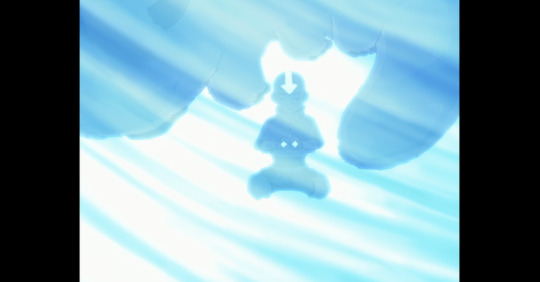
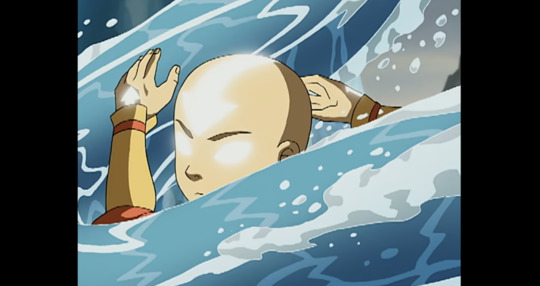
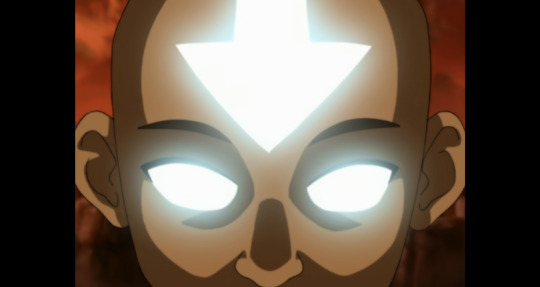
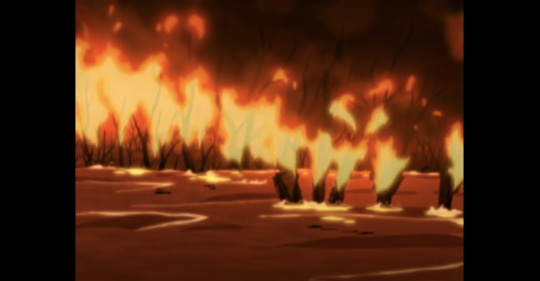
Water can be the element of healing, which is what Aang hopes to do in ending the war and saving the world. It can be the element of immense destruction as well (Koizilla, or the mighty ocean) very similarly to a grief induced Avatar State. Finally, being coerced into the Avatar State and into bloodbending — both include being controlled from within and simultaneously being out of control, albeit in different ways — are likewise paralleled.
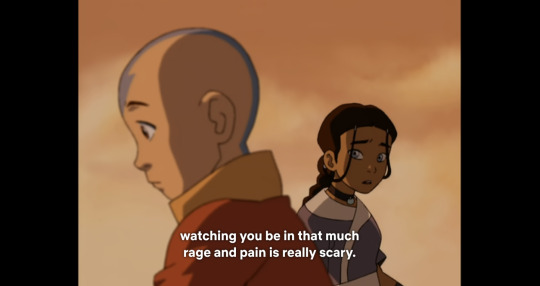
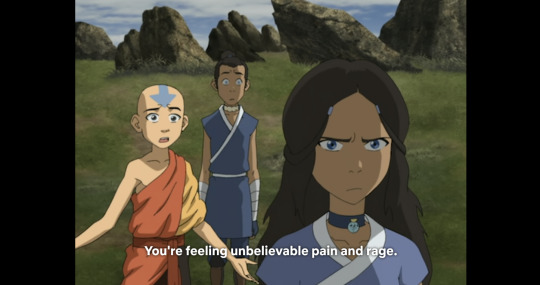
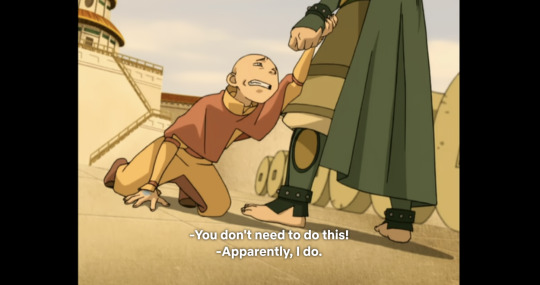
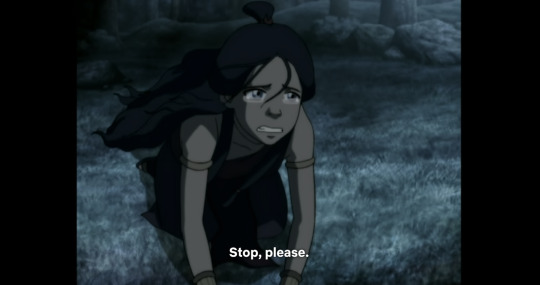
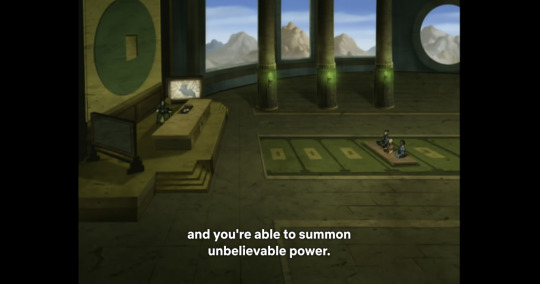
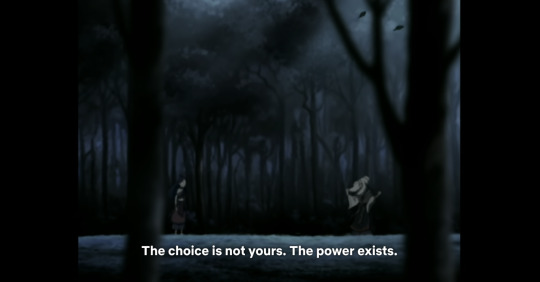
Last but not least, like the moon and the tides, Aang may continually leave the shore... but he also likewise always returns.
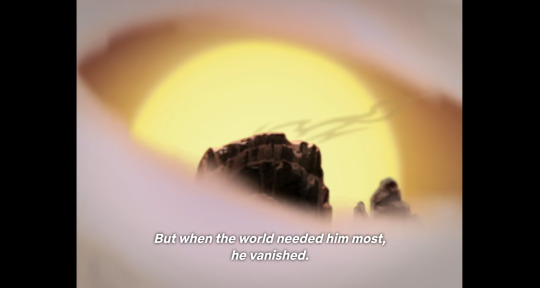
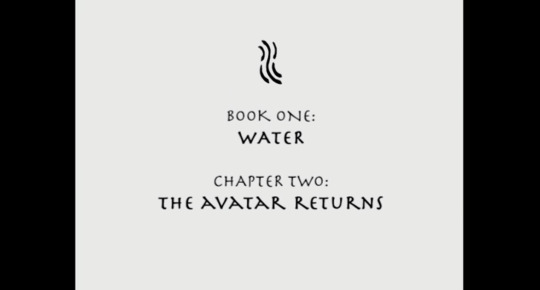
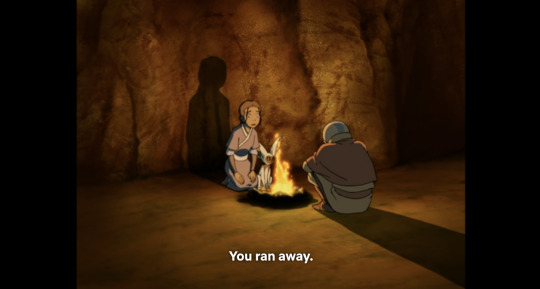
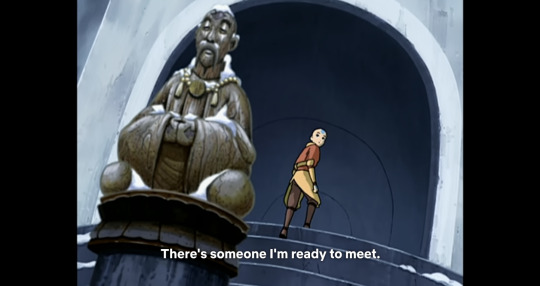
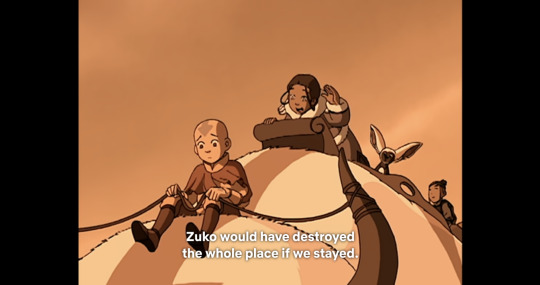
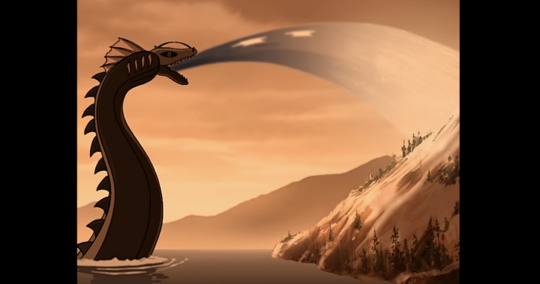
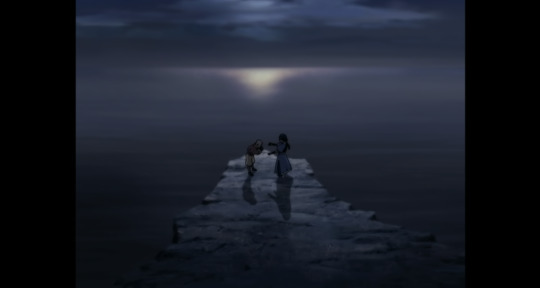
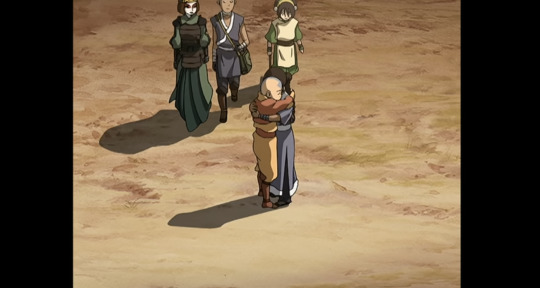
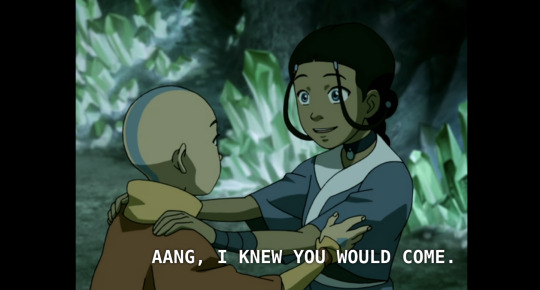
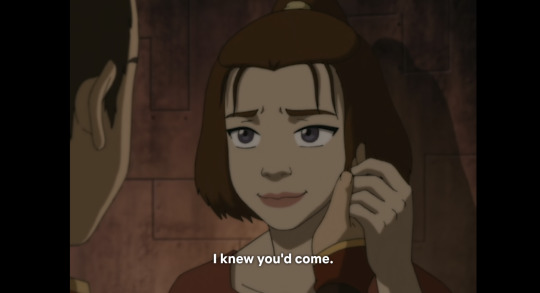
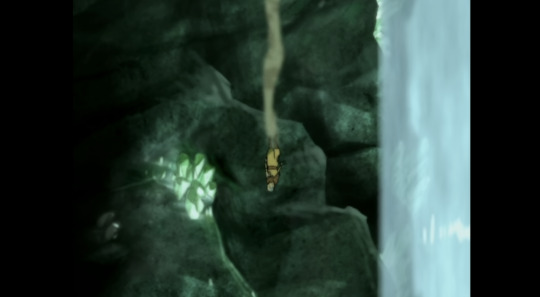
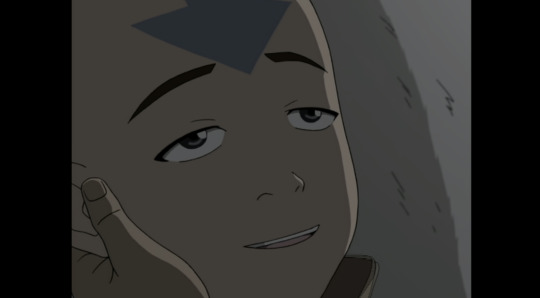
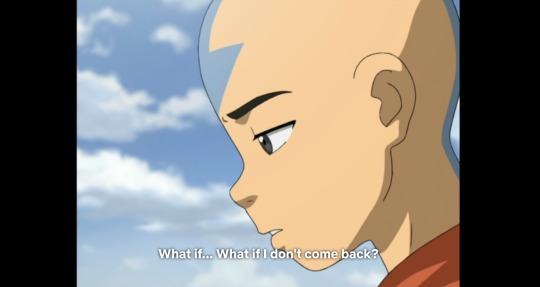
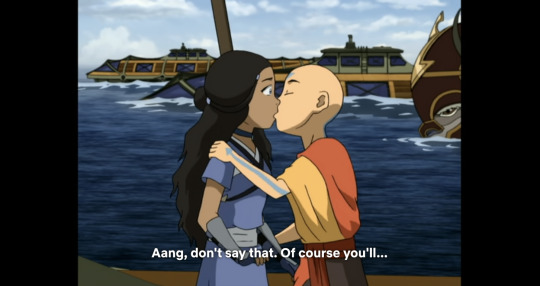
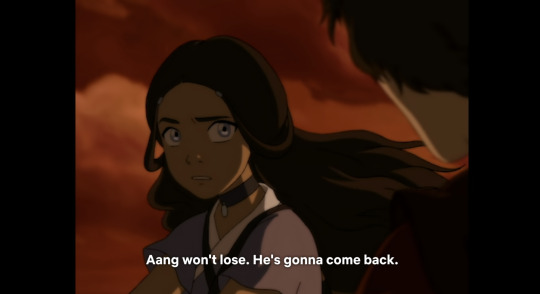
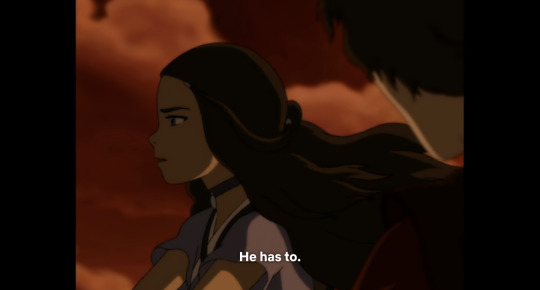
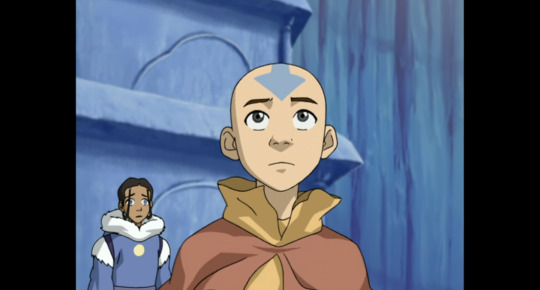
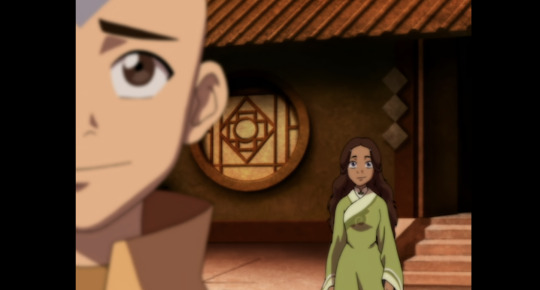
He comes back from supposed death (the iceberg), literal death (book 2), and the verge of death (destruction of his energy; potential destruction of his sense of self and culture in Sozin's Comet, on the anniversary of his people's genocide no less) throughout the seasons. He can "get so angry you aren't even you anymore" but also returns to himself and by proxy, always returns to and likewise reaffirms Katara and her sense of self as well the same way her bending and love of her bending does.
Air is freedom, but water is cyclical and rooted in community... both things that the Avatar cycle as a reincarnation cycle necessitates and nurtures, and I think that's beautiful.
#kataang#aanglove#aang#atla#avatar: the last airbender#atla meta#analysis series#analysis#mine#anyway time to never write atla meta again#i need to finish my [checks drafts] 30 more dragon prince ones
57 notes
·
View notes
Text
Myth, Muse, and Mourning in the Figure of Émilie Agreste: A Study of Her Portrayals in My Work
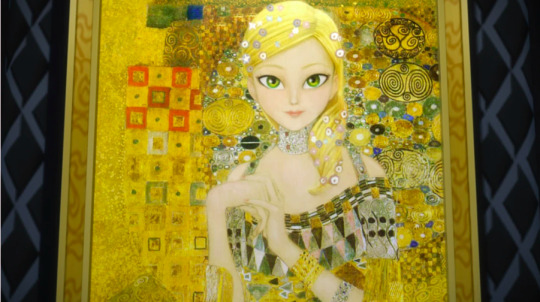
This contains spoilers for three of my stories: House of Agreste, Flightless Birds, and Smalltown Boy.
Before Émilie Agreste was a mother, a muse, or a dead woman, she was a myth. Or rather, she became one. In canon, she exists as a doll in a pod, a photograph on the wall, little video diaries saved into Nathalie’s phone, a rose-tinted memory etched onto Adrien’s longing, and stories told through notorious unreliable narrator Gabriel Agreste. She’s a beautiful absence, made notable by how little she is allowed to be.
In my stories, namely House of Agreste, Flightless Birds, and the second half of Smalltown Boy, Émilie steps out of the shadows and into her own body. She speaks, smokes, flirts, argues, grieves, and easily spins entire worlds around her. Still, no matter how vivid she becomes, her tragedy lingers. Like the women whose legacies have shaped her at various points in my stories, Adele Bloch-Bauer, Sharon Tate, Marie Antoinette, and Courtney Love, Émilie is at once an icon and individual, muse and martyr, beauty and ruin. No matter where, when, or how, Émilie’s image is never formed in a vacuum.
These women share little in biography, but much in aesthetic myth. They are looked at more than they are heard and they become symbols of everything society projects onto femininity: adoration, jealousy, control, desire, blame. Each of them, in different ways, informs the Émilies I’ve built not as a one-to-one allegory but as facets in a broken mirror. Through them, Émilie becomes a portrait, a ghost, a queen, and a calamity.
All the things we want from beautiful women, and all the ways we destroy them for it.
I. The Portrait: Émilie as Adele Bloch-Bauer

To be painted is to be preserved, but not to live.
Adele Bloch-Bauer was a Jewish Viennese socialite and patron of the arts in the early 20th century, known for her intelligence, elegance, and sharp political mind. She was painted twice by Gustav Klimt, most famously in Portrait of Adele Bloch-Bauer I, a masterpiece of gold leaf and patterning and a visual symbol in Miraculous throughout Seasons 1 to 5, as well as a haunting constant in House of Agreste. In the real world, the painting, later stolen by the Nazis and eventually returned to her family, became a symbol of her beauty and of a stolen legacy.
But in the portrait itself, naturally, Adele is unvoiced. Obviously, it’s a portrait. She’s stylized into ornament, a woman flattened into iconography, and her expression is completely unreadable beneath layers of abstraction. The real Adele disappears beneath Klimt’s devotion. She becomes mythic. Untouchable.
“I want it. How much could it be? I’ve yet to find a work of art I couldn’t afford.” “It’s one of the most famous paintings in the world, Émilie. It’s priceless. And I don’t think it’d be fair to her niece.” “Then I want to be her.” Nathalie looked intrigued. “Her life was tragic. There really isn’t much to envy.” “No, you don’t understand,” she said as she took a few steps back, framing the painting from afar with her hands. “I want to be her. I want you to find me an artist I could commission to recreate it, in the exact style of Klimt. But I would be Adele Bloch-Bauer,” she turned to her then with a million-dollar smile. “You’d do this for me, wouldn’t you?” “I’ll… see what I can do.”
House of Agreste — Chapter 3
Émilie inhabits a similar contradiction in House of Agreste. She is the face of Gabriel’s fashion empire, the namesake of his most celebrated dress, “The Émilie Dress,” which is reworked and paraded through every season like a ritual. She’s the woman behind the muse, but eventually, the muse overtakes the woman. Gabriel curates, rather than loves her. He dresses her like his very own Barbie Doll, displays her, claims her as his ultimate source of inspiration and creation in an interview with a British Vogue journalist. He elevates her into a symbol of his genius and her identity consequently becomes molded into fabric and sewn into silhouette.
And yet, Émilie is no passive canvas. In my retelling, she participates in the mythmaking. She advises Gabriel on what women love and want, quotes Style Queen reviews back to him, lets herself be idealized and sometimes sharpens the illusion herself. She knows she is part of the exhibit. That her beauty, her body, her name are all on display.
But a portrait does not age. A portrait does not weep, or argue, or change. A portrait does not fight back. And when Émilie disappears, Gabriel clings harder to the version of her he can control; namely the ghost in the painting. The muse who never says no.
The gold leaf, after all, never tarnishes.
II. The Beautiful Victim: Émilie as Sharon Tate

As sad as it sounds, Sharon Tate’s death is what made her famous. Not her films, not her voice, not her love.
Sharon Tate has become less a woman than a genre: the innocent American starlet, framed in perfect 1960s light, forever paused just before catastrophe. What holds the public’s fascination is her death, her beauty, her body, pregnant and doomed. She was lovely, and she was loved, and she was murdered, and the tragedy is made more palatable because she was photogenic.
“First of all,” she began, gently lifting Nathalie’s index finger as if to keep count. “You know how my agent called the other day? I was cast to play Sharon Tate in a comedy-drama about Hollywood’s golden age.” “That’s great,” she said, racking her brain to remember exactly who was Sharon Tate. “It’s a big role.” “It is. I’ve looked up to her for as long as I can remember. I’ve always said, if it wasn’t for Gabriel, I’d be living it up in LA, a house on the hills, partying every night. I can do a mean American accent, you want to hear it? “Um...” "We can run some lines together later. I can’t wait to play her, even though I’m not exactly chuffed by the thought of playing wife to Roman Polanski, but we’ll cross that bridge when we come to it.”
House of Agreste — Chapter 3
For context, in House of Agreste, before her miscarriage, Émilie was cast in a fictionalized version of Quentin Tarantino's Once Upon a Time in Hollywood. Naturally, Émilie was thrilled. She idolized her! She wanted to wear the go-go boots and the eyeliner, to swirl around in sun-drenched California light and leave audiences breathless. For a brief moment, it felt like a tribute to the actress she loved so much.
Émilie, in this story, is somewhere between a B-list and A-list actress, so, famous enough to be recognized, photographed, whispered about. She isn't a nobody dreaming of fame; she’s there, or nearly there.
She knows what it's like to be a woman turned public property. To have people comment on her waistline in magazines, to be celebrated when she smiles and ripped apart when she doesn’t. Sharon Tate represented a kind of performance Émilie once aspired to; beauty without bitterness, attention without the sting. Sharon was a woman adored for being, not doing. She floated rather than clawed. That was what Émilie admired: the ease, the myth of being wanted without having to fight for it.
But then Émilie had the miscarriage.
And suddenly, she could not play a woman eight months pregnant who would be murdered onscreen for aesthetic purposes.
(Nota bene, and SPOILER alert for the real movie: in Once Upon a Time in Hollywood, Sharon Tate's character is famously not murdered. Tarantino rewrites history, saving her in a fantasy of retroactive justice but even in that revision, she is more symbol than subject. She’s spared, but not centered. The myth remains intact.)
That moment reframes everything. Émilie ceases to participate in the myth and becomes a critic of it, recognizes how beauty becomes a curse, how pregnancy becomes spectacle, how violence against women is endlessly reenacted for art and entertainment and catharsis. She now knows what it means to be adored until you bleed, and rejects the commodification of her own grief by refusing to let her body be a prop. This refusal, though, does not save her. Her trajectory, like Sharon’s, still leads to disappearance, to martyrdom, to myth.
She was beloved, and when she was gone, her image lingered longer than her voice ever did.
III. Let Them Wear Couture: Émilie as Marie Antoinette

Marie Antoinette, frivolous queen of aesthetic excess, became the face of a revolution for what she represented. She was punished not because she was a tyrant, but for spending too much, dressing too extravagantly, smiling too prettily in a time of collapse.
“I would love to play Marie-Antoinette in a movie. I just… I get her.” Nathalie smiled, meeting her eyes. “I get the feeling you’d make a very convincing Marie-Antoinette.” “And I’ll take it as a compliment… Shall we go this way then?”
House of Agreste — Chapter 3
In House of Agreste, Émilie is the queen of the house. She climbs the fashion ladder beside Gabriel as a business partner. She is the one who speaks to investors, who knows when to flatter and when to threaten.
What Marie Antoinette also was, though, was a queen who liked to play peasants. She escaped the constraints of Versailles by retreating to the Petit Trianon, where she dressed in linen chemises, milked cows for fun, and entertained fantasies of simplicity all while the country starved outside her fake little sanctuary. She was therefore also hated for the performance of humility, for making poverty look picturesque.
In Smalltown Boy, despite being literal royalty, Émilie cosplays a broke girl, and Gabriel (Gabi, at the time), takes notice immediately.
“I don’t hate it,” she says, dreamily. “This place. It’s got that bohemian charm you hear about in the Aznavour songs. Artists scraping by on passion and cheap wine… Not glamorous, but… we’re free. I could tell you a great deal about freedom. And how important it is to me.” A small part of Gabi wants to point out that this studio is a romantic concept mostly for someone who grew up with more bathrooms than family members. Émilie is like a modern-day Marie Antoinette when she built her little farm at Versailles and wore peasant “shepherdess” dresses for fun, accidentally launching an entire trend in 1700s high-society court fashion. He’s seen the glint of real silverware in the few boxes Émilie brought along, the embossed stationery with her family crest. It’s a constant reminder that if she fails, she can always go back to velvet drapes and fine china. If he fails, it’s back to… well, nothing.
Smalltown Boy — Chapter 2
Smalltown Boy was only written once I felt I could finally see the bigger picture. Representation, Revelation, and Werepapas gave me the missing puzzle pieces that I had been looking for since I started watching Miraculous. House of Agreste's Émilie came first, a product of my imagination based on little clues in the show, then Flightless Birds', which was an educated guess based on the information given by Félix and Kagami's play.
The new context we were offered recently has given birth to yet another depiction of Émilie’s character in my story.
She smokes secondhand cigarettes in her husband's crumbling flat, dresses like a waifish art student, flirts with other people’s trauma like it’s an aesthetic. It’s not that she lacks intelligence, far from it. But her detachment is a luxury and she knows it.
Gabriel, in contrast, grew up in the kind of house that smelled like fryer grease and unpaid bills. He didn’t pretend to be poor, he was. He worked shifts, and stared down the inevitability of staying small unless he carved out a future with his own hands. Their class difference is the unspoken language between them, one she occasionally romanticizes and he occasionally resents.
When they meet, she treats his reality like a costume party.
What a lovely place! she’d exclaimed, twirling around the dead streets and sampling a single fry from the family-owned friterie. How quaint and charming!
Smalltown Boy — Chapter 2
She thinks of post offices and rusted fences as aesthetic, calls their attic of an apartment bohemian and wants to live in a Godard film where nobody eats but everyone is beautiful.
As a side note, and speaking of Godard, Émilie’s relationship with performance, beauty, and the aestheticization of suffering is yet again depicted in Flightless Birds. In the story, Émilie plays Nana in the movie Solitude, a fictional version of Vivre sa Vie [1962], and channels the same fragile beauty and performative despair that defined Anna Karina’s character. Like Nana, Émilie turns her suffering into spectacle. It allows her to rehearse tragedy, to play at ruin, to live out existential collapse onstage without having to truly endure it.
In conclusion, like Marie Antoinette, Émilie doesn’t mean to offend. She’s not malicious, she’s curious, and doesn’t see how her presence distorts the room. How her poverty is always a phase, a mood, a role she can exit at any time.
IV. Disaster Icon: Émilie as Courtney Love

Where the previous icons I’ve named were silenced by death, Courtney Love has survived by being loud, brash, feral, loving, grieving, and resisting the saint-or-sinner binary forced onto widows and mothers. She is accused, exalted, and ridiculed in equal measure.
Audrey caught the girl giving her a nasty glare. “Oh, relax, Courtney Love, I won’t steal him from you,” she cackled, stepping closer. “Heard of you, Émilie G.”
Flightless Birds — Chapter 4 (The Brooch)
When Audrey Bourgeois first meets Émilie in Flightless Birds after praising Gabi for his incredibly promising first collection at Fashion Week, she narrows her eyes, sizes Émilie up, and calls her, “Courtney Love.” It’s not a compliment.
She mainly says it because of Émilie’s grunge look in that scene, some kind of jab at it, but there are layers and implications that come with the name.
The name makes you think of fishnets, smeared lipstick, tabloid carnage. Courtney Love is a litmus test for everything people love and loathe about women. Was she the witch or the widow, the muse or the murderer, the parasite or the prophet?
So when Audrey calls Émilie “Courtney Love,” what she means is too loud, too emotional, too ambitious, too sexual, too much. Basically, a woman who refuses to fade politely into the background of her famous man’s spotlight.
And Audrey’s not wrong.
In Flightless Birds, Émilie has not yet become a muse as she is still fighting for control after escaping from an arranged marriage that would have ruined her, and is trying to make something of herself. She’s messy, sharp, magnetic, and much like Courtney, Émilie falls in love with a man who is actively breaking. Gabriel, like Kurt Cobain, is an artist with a soft-spoken center and a gaping wound where emotional intimacy should live.
There was a pause, and then he replied. “(... ) You’re what’s keeping me sane.” (...) “I don’t want you to be sane.”
House of Agreste — Chapter 1
“Of course he is,” Émilie replied, positively glowing. She crossed her arms and leaned against the doorframe, watching him like an artist’s muse observing the creation of her own portrait. “He’s fretting. You see that? The pacing, the refusal to rest… classic artiste behavior. It’s thrilling. Passion like that, it’s… intoxicating. Nothing good ever comes out of a sound, undisturbed mind.”
House of Agreste — Chapter 1
Courtney Love was often vilified as manipulative, some kind of “Yoko Ono figure” blamed for Kurt Cobain’s self-destruction, as if women exist only to corrupt or save genius. In reality, theirs was a mutually destructive bond: two artists enabling each other’s addictions. Émilie and Gabriel mirror this dynamic closely, particularly in House of Agreste. She feeds his insanity, knows when he’s unraveling and leans into it, out of a private thrill. It makes her feel powerful, desired, and indispensable.
What’s interesting is that when I wrote House of Agreste, I hadn’t consciously drawn the parallel to Courtney Love. And yet, the reference surfaces anyway in the scene where Audrey Bourgeois warns Gabriel about Émilie. The myth was already there, waiting to be named.
“You know, Gabriel, I don’t carry Émilie in my heart and never really have. I warned you from the beginning, didn’t I? Told you she was all surface, no substance. Beautiful, yes, but insincere to her very core. And what did you do? You ignored me. Built your entire brand around her. Named collections after her. You practically handed her a pedestal and begged her to stand on it.” “Your point?” “My point,” she said, circling him like a cat with a mouse, “is that she doesn’t love you. She loves what you represent; adoration, power, relevance. That’s all she’s ever cared about.” “All right.” His voice was a knife in velvet. “You’ve made yourself perfectly clear.” “Have I? Because you’re still standing there, pretending she’s the saint you painted her as. I’m not trying to be cruel, Gabriel. I’m trying to save you from yourself. One day, she’s going to leave, and when she does, there won’t be enough left of you to stitch together.”
House of Agreste — Chapter 5
Courtney Love was never forgiven for surviving Kurt. Not because anyone really believed she killed him, but because people wanted to believe she could.
Unlike the popular story of Kurt and Courtney, though, Gabriel lives. And in living, he rewrites everything. He makes Émilie into his excuse, his idol, his martyr, the perfect posthumous love story. What he cannot control in life, he canonizes in loss.
“You owned the 90s and God knows there was some tough competition out there. Do you know what it takes to be able to steal the spotlight from the likes of Chanel, Prada and Versace at that time? You put up a fierce fight this last decade too, and I know you’ve got so much more to give to this world… At the end of the day, you made this happen with your own two hands. She helped, but she didn’t make you, you made your own self. You can do it without her.”
House of Agreste — Chapter 9
When the smoke clears in the end, we remember the geniuses these two women loved. But we never stop talking about the women who were too loud next to them.
V. The Afterlife of Émilie

What links all of these women, Adele, Sharon, Marie Antoinette, Courtney, is the way they persist even when gone, or shunned, or vilified, they remain embedded in culture. As a painting, a headline, a cautionary tale.
Émilie, too, haunts everything. She’s the mother Adrien idolizes. The ghost Gabriel worships. The sister Amélie cannot forgive. Every choice they make is in reaction to her, to the idea of her. In death, she becomes omnipresent.
But perhaps the most chilling thing is that we never get Émilie whole. Not in canon, and not even in fanfiction. Every version of her is a reconstruction, including mine. It’s always a narrative curated by someone else, a story told by those who survived her.
Which is to say: Émilie is a reflection of how we view women and of what we value in their silence, of what we mourn and what we fetishize. She is a beautiful corpse, a golden queen, a dirt-streaked child in the woods, she is a ghost in couture, and like all women who are too looked-at and too loved, she is more myth than memory.
And that is what makes her unforgettable.
60 notes
·
View notes
Text
I think this art represents crumbling internal self perception of white men after being buttered up with salty greasy compliments that too much of means nothing, leaving nothing but an empty shell of himself, crusty, hallow, and broken.
What do you think this means? Enter your bullshit...uh... art analysis below!
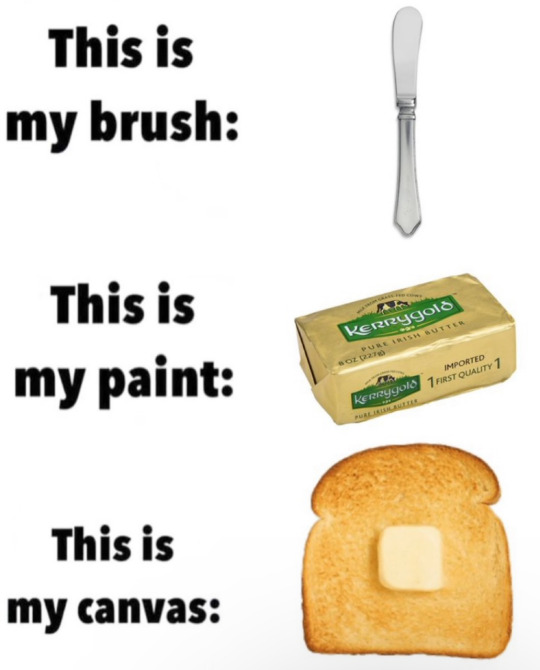
18K notes
·
View notes
Note
Alright, I've entered your ask box. I say you do character studies. You write Leona so well ... Tell me how you developed your voice for him. Was he hard or easy to develop?
I think I'm naturally pretty good at picking up character voices (a skill that I think stems from having a more analytical brain when it comes to reading and writing). So, I never do anything too crazy to find a character voice, but I try to keep a few things in mind for Leona as I write.
Leona is very, very depressed. He doesn't have a lot of fight in him, but I get the sense that he wants to have that. He tried to make a grab for power during the Spelldrive tournament, but the second he was hit with resistance, he gave up. Leona is a prince, so he doesn't want for anything. This is in contrast to Ruggie, who is of low status and low income. Ruggie has a reason to fight for things. Both Leona and Ruggie want to elevate their status (Leona wishes he could be king, Ruggie wishes for a better life), but of the two of them, only Ruggie has an actual need to do so. Leona could bed-rot for the rest of his life and, so long as he doesn't get disowned or something, he would be fine.
He knows this. Leona is, in his mind, as advanced in life as he ever will be. He's highly skilled at magic, but that doesn't matter in the long run. Even if he was terrible at magic, he would be in the same boat. Leona could absolutely live a fulfilling life and make his kingdom better, but he's too focused on what he has 'lost' and can never have.
Despite this, he didn't take a 'shut myself away and ruin my self-esteem' approach like Idia. Leona knows that he's something; his dorm members practically worship him. During his time in NRC, he can rule the roost, so that's what he does.
This background could be argued to be what fills him with bitterness (because he one bitter, bitter man). He's arrogant enough to believe that he deserves to be king (his point of view seems to be that he's more qualified than Falena, and that he's been messed over by the way succession works... also, he's very annoyed that a literal toddler now outranks him, he could punt that baby into the moon).
So, we have a second son who feels entitled to power, who is bitter that he cannot get it, and who has been struggling with a lack of agency for his whole life. Add on that he may have been ostracised for having a destructive unique magic, and you have a fine blend of a very dysfunctional, flawed man.
With all this in mind, it's easy to see why he acts out in the ways he does.
When you consider what he would be like in a relationship... He would absolutely love having some level of power, and knowing that above all others, he was chosen.
The Sunset Savanna is somewhat matriarchal (they have a king, but it might just be that gender plays no role in succession, so the values seem a little at odds with the system of governance), and highly values women. Men and boys from there would absolutely be taught to respect their partner (I feel like this would come into play regardless of their gender).
Anyways, those are the sort of things that inform the way that I write Leona. In BTBCBT the polyamoury aspect was written to be the sociatal norm (based on actual lions), and Leona is okay with sharing because he's at the head of the internal power structure. He's been trusted with a level of control over his harem partners. Ruggie defers to him, and on some level, so does the reader, though the reader pushes back. The reason why having a bratty reader is fine by Leona, in the context of the fic, is that they treat him as a person rather than a prince (because they could not care less, this is not their world, they haven't been raised to respect these people). If Ruggie seriously pushed back and tried to become the head of the relationship, that would not go down well.
Having such a relationship gives Leona the agency he craves. It's his personal form of rebellion. Whenever it is threatened (even if that threat is a flawed perception) he sort of shuts down. He gets grumpy and pouty about it, maybe even noticeably annoyed, but on a deeper level, he would internalise that as a failing of himself.
If anybody ever cheated on Leona, it would proooobably ruin his last shred of hope. That's why he keeps his inner-circle small - less chances for it to all go haywire, less people to deal with.
I think something that really influences the way I write Leona is the phrase 'Laziness is not the disease, it is a symptom'. He's not lazy just 'cause, it's a symptom of something deeper... Because he is VERY depressed.
#leona kingscholar#twisted wonderland#disney twst#analysis#ruggie bucchi#leona kingsholar x reader#asks
36 notes
·
View notes
Note
What's an unpopular opinion you have on the show?
That Bedelia was in love with Hannibal. And that Hobbs was weird towards Abigail but Will couldn't see it because he was empathizing with Hobbs and he obviously did not perceive what he was doing as weird or incestuous, hence why Will said "he would never dishonor them like that". That Will did not love Molly (he could not verbalize it) but he tried.
#nbc hannibal#musings#hannigram#will graham#hannibal lecter#hannibal analysis#analysis#meta#hannibal meta
70 notes
·
View notes
Text
Rick and Morty's dynamic for each season! I finally finished it!
THIS POST IS VERY VERYY LONG, THE WHOLE POST IS UNDER THE CUT
Heyyy, happy Easter to my followers! This is my easter gift for y’all! Don’t say I never do anything for you! Sooo, since I reached 300 followers! I love you all, by the way! Mwah! Mwah! And to celebrate, I made a poll to ask you guys what you'd like me to do, anddd you said that you'd like me to make an overanalysis of Rick and Morty's dynamic each season! This doesn't exactly surprise me; a lot of people said that they followed me because of my analysis! So this doesn't surprise me too much! And this will be the 2,000th post on my account! I honestly never expected to keep this blog going for this long, but I'm glad I did! Because if I didn't, I would've never met so many kind people! Okay, okay, enough with the sappy stuff before I turn into a tree (I stole that joke from a youtube, who did I steal it from? I'll never tell! Mwah-ha-ha- wha-? This is a Wendys? Oh uhm yeah of course, sorry) Now let's jump into it starting from the beginning!
~ Season 1 ~
Okay, let's begin with them in season 1! This was definitely their dynamic at their most exploitative, I'd say. In episode 1 alone, we see that Rick:
1. Barges into Morty's room while he's sleeping and DRAGS HIM OUT OF BED BY HIS ANKLE so they can go on an adventure
2. Drags Morty out of school so he can help him on an adventure, then pressures Morty when he's hesitant
3. Didn't care when Morty's legs broke due to Rick not telling him something, then acted like it was Morty's fault for not knowing information that Rick didn't give him, and only fixed Morty's legs when he was rightfully pissed at him
4. Encourages Morty to stick megaseeds up his uh...bottom so they can smuggle them through interdimensional customs, then didn't do anything when they dissolved, which made Morty lose his motor skills and brain functionality for 72 hours
5. Lied to Morty about the security guards being robots, so Morty shoots them, and showed no sympathy for Morty when he was horrified that he shot them
6. Used Morty's temporary super intelligence so he could get himself out of trouble, then ranted to Morty, telling him that he will keep his mouth shut about their adventures
And that was in the first episode alone, and we can clearly see that he has very little to no respect for Morty. Only using him for adventures and not caring about Morty's feelings or autonomy, outright forcing him to go on adventures when he doesn't want to. Even in Rick's worst season (season 4), he never forces Morty to go on adventures with him, even if he is mean or annoyed when Morty doesn't want to. It's pretty safe to say that for the first few episodes of season 1, he didn't even see Morty as a person but instead as a tool that is useful for adventures.
We see him again, disregarding Morty's autonomy in episode 3. Dragging Morty away from a family Christmas without making sure he's ok with it. Even insulting Morty's intelligence for literally no reason afterward. Calling his brain his "little walnut" and casually mentioning to him that he has to hold his breath before he minimizes him or his organs will collapse. He also minimizes Morty's girlfriend in this episode, keeping Morty isolated and preventing him from having a relationship with someone his age. We see him doing something similar when he drags Morty away from Jessica at the end of episode 1. While I heavily doubt that Rick is grooming Morty (For non-sexual reasons, ofc), and if he is, that's not what the writer intended; he does fit the isolating step disturbingly well. However, he is most likely doing this to keep Morty dependent on him and not to groom him. It's still fucked up either way.
Then we see him disregard Morty's autonomy yet again in episode 4, where he drags Morty out of class, speaking for Morty when Mr. Goldenfold says if Morty leaves he's giving him an F. (Granted, Rick knew that this wasn't real, but he knew that Morty didn't know that, and believed that Morty was real)
Mr Goldenfold: If he leaves, I'm giving him an F!
Rick: He doesn't care!
Now, Rick does actually care about Morty in season one and has episodes where he shows that, but these are few and far between, and the bad in this season heavily outweighs the good, but for argument's sake, I will point them out.
1. Episode 4, he gets angry and protective when he finds out that aliens watched Morty while he was...uncovered, even attempts to lunge at them for doing so, which is sweet considering that Jerry, Morty's dad, didn't give 2 flying fucks.
2. Episode 5, comforts Morty after what happened with Mr. Jellybean, and even kills Mr. Jellybean for the sick shit he did, which is absolutely deserved.
3. Episode 9, Rick was happy to see Morty when he was alone at the Smith's house, but quickly covered it up because feelings are for losers, ig.
4. Episode 10, Rick angrily tells the other Ricks to "leave my Morty out of this" when they take him to the council.
5. Episode 11 has cute bonding moments with Summer and Morty at the end of the episode.
Now, Rick, despite still caring about Morty, was very exploitative and saw Morty more like a tool he can use on an adventure instead of a person. A good example of this is this exchange in episode 10
Morty: Oh my god, Rick! There's a bunch of people strapped to that building!
Rick: Not people, Morty...Mortys.
Soooo yeah, that line straight up shows that at this moment, he didn't see Morty as a person, he even admitted to fiddling with the concept of torturing Mortys to hide from other Ricks (He says that he did it "On paper" but we can see when the memories are scanned that he did do this) and he took a voucher for a free replacement Morty. Again, showing that he saw Morty more as a tool that can be replaced easily, and not a real person...but that was until...
~ Season 2 ~
We're at Season 2, baby! Now, Rick and Morty's dynamic was still toxic in season 2, but Rick is finally seeing, or at the very least starting to see, Morty as a person rather than a tool. A VERY good example of this is in the very first episode, A Rickle In Time, I'm sure if you've watched the show, you know what scene I'm going to bring up, the scene where Rick, without hesitation, gives Morty his time collar. This is a huge moment. Also, in that episode, the timeline splits whenever a character is uncertain about something, and when Rick gave Morty his time collar, letting himself be stuck in a timeless oblivion so Morty will be ok. And his literal only request was that Morty be a better person than him.
While this scene is adorable and is the only proof that you need to see how much Rick truly cares about Morty, it also shows that he still sees himself as "above" Morty in some way, due to his delusional god complex, which was still strong here. Considering that he said, "Be better than me," saying that he doesn't see Morty as above him, it could be implied that he sees Morty as equal in this scene, but considering how he treats Morty in this season, I doubt it. Now, in this season, Rick is definetily less exploitative. He still doesn't treat Morty great, but he doesn't exploit him as much as he did in season 1.
Now, this isn't to say he treats Morty well; he still emotionally abuses him regularly, not caring when Morty is hurt by what he said. Like in A Rickle in Time, when Morty tells him, "Words hurt!" and Rick has no reaction. He also insults him a lot in Mortynight Run, even when he thinks that Morty is hurt after Fart left. Completely willing to kick Morty down, and the way he does it so gleefully doesn't exactly help. He also wasn't worried about Morty when he left in These Ricks Must Be Crazy, which will wildly contrast season 3, where they went HARD on Rick caring about Morty. Not that I'm complaining!
Rick also leaves Morty twice in this season, adding to Morty's abandonment issues, which, uh...isn't something a good grandpa would do. He fully meant to abandon Morty in Auto Erotic Assimulation, but only came back since Unity left him. He also left Morty to turn himself in in The Wedding Squanchers, which, whether Rick notices it or not, is a common manipulation tactic for codependency. Showering someone with attention, then leaving, which will make people so desprate for more attention that they will quickly become depedent on you, which is what Rick did here, although I am pretty sure it wasn't intentional, as he did what he did out of a desire for the Smith family to have a normal life, after he heard Beth crying saying that she'll let Rick do whatever he wants because she doesn't want him to leave again. I refuse to believe that was a cold, calculated move, as I doubt that he would want to willingly relive his trauma in the season 3 premiere. But whether Rick intended it or not, he did use this manipulation tactic, which caused Morty to become very codependent on him, since I would argue that he wasn't as codependent in earlier seasons as he is in later seasons. Especially considering that Morty threatened to kill Rick in Look Who's Purging now.
This is where tension starts to build in their relationship, and we see more of Morty's seething anger towards Rick and repressed rage. Rick is aware of Morty's repressed rage, but doesn't do anything about it, making Morty believe that he doesn't have it at the end of the episode by lying to him that a candy bar he ate amplified his violent tendencies. This may seem sweet, and in a way, it is, since Rick did this to clear Morty's conscience. But Morty deserves to know about his repressed rage so he can do something about it and work on it. But Rick is inherently keeping this information from Morty, making the inherent power dynamic they have, considering it's a younger family member and an older family member, even more unhealthy. Since Rick knows something big about Morty that Morty doesn't know about himself, Rick is purposefully keeping this information away from him. Although we never see Rick attempt to exploit Morty's repressed rage, keeping something this big from him isn't ok.
Again, Rick still cares about Morty in this season, sacfricing himself to save Morty, saving Morty in Mortynight Run, although he bitched and complained, being worried about Morty when Unity blew up a town, watching a movie with Morty and Summer and happily getting ice cream with them, etc., etc.
We do get more moments of him and Morty caring about each other and bonding since Rick is seeing Morty as a person instead of a tool he uses on adventures, but their dynamic is still heavily unhealthy with a huge power imbalance, and has Rick making Morty's codependency on him worse.
So while Rick exploits Morty less and is finally seeing Morty as a person, their dynamic is still very unhealthy, with a huge power imbalance and codependency galore. Now, let's get to season 3!
~ Season 3 ~
In season 3, we not only get more tension with Rick and Morty's relationship, with Morty shooting Rick in the head and yelling "Who's stupid now bitch!?" To be fair, it was a fake gun, but Morty didn't know that. Morty also tricks Rick into taking Jerry on an adventure since he just wanted a break from the adventures. But we also see the codependency leak into other parts of Morty's life. Morty starts to have repressed rage towards Jerry, as we see him attacking people while pretending that they are Jerry in Rickmancing the Stone.
You may be wondering how this has anything to do with his relationship to Rick, while codepedency can lead to estrangened relationships with other family members (https://castimonia.org/2021/09/05/codependent-families-family-roles-whats-yours/) since family members may struggle for power, which is something we see Jerry do with Rick, another reason why Morty may have repressed rage towards Jerry is because people who are codepedent on others may adopt their opinions on the belief that it'll give them validation (https://codependencyrecovery.org/2022/11/04/worrying-what-other-people-think/) so another reason could be because Morty recogonized that Rick hates Jerry and adopted that same opinion without realizing it, causing him to seethe in anger before his repressed rage for Jerry formed. It could also be his way of getting his repressed rage out by taking it out on unrelated people, he literally said this in season 3 episode 2, "What if we...didn't do it? What if we just went back to the blood dome and kept taking our baggage out on unrelated people?"
Rick also isolates Morty more with his season 3 premiere speech.
"I just took over the family, Morty! And if you tell your mom and sister I said any of this, I'll deny it! And they'll take my side because I'm a hero, Morty! Now you'll have to go and do whatever I say, Morty! FOREVER!"
This is a common manipulation tactic. Making your victim believe that nobody will believe them, so they may as well not even bother telling anyone, also burdening your victim with a big secret, and expecting them to keep it, which allows the abuser to hold more power over their victim. He knows that Beth has abandonment issues and knows that she'll take Rick's side if Morty tries to tell her just how dangerous his adventures with Rick are. It's chilling how many manipulation tactics Rick takes with Morty, to keep control over Morty and to keep Morty codependent on him.
Now, for Rick, this makes sense; he craves control. This codependency is something that Rick doesn't get, he's uncertain about it, and it doesn't make sense to him, so he tries to control Morty so he can regain the feeling he likes of having everything under control. He also sees that Rick KNOWS that doing these manipulation tactics is giving him control over Morty, which makes it VERY unlikely that he's doing these on accident, as he says this to Morty when he's in his toxic form in season 3 episode 6:
"You can die when I say so! I control you! I control the universe!"
We also see just how badly Rick's emotional abuse affected Morty, with toxic Morty being HEAVILY insecure, saying things including but not limited to:
"I don't want to be on camera, I'm ugly and gross, please!" "I did it, Rick! I got the tank! I'm a piece of shit, but I got the tank!" and "I think my voice is annoying"
We also see him agreeing with Toxic Rick with everything, something that emotional abuse victims tend to do to minimize abusive events, this becomes even more apparent when we find out that Mortys are breed to be as forgiving as possible, and a lot of emotional abuse victims tend to be forgiving towards their abusers (https://psychcentral.com/health/coercive-control#recap)
Morty also being heavily insecure is another sign of codependency, as when someone is codependent, their view of themselves is heavily tied to what the person they are codependent on thinks of them. Morty also saying that he dislikes confrontation in the episode could be tied to emotional abuse, or it could be that and a mix of codepedency, as people who are codepedent have self worth tied to the person they are codepedent on, and because of that will avoid conflicts with them since they want to be liked by them. (https://www.simplypsychology.org/signs-of-codependency.html)
Another thing I want to point out is Morty’s lack of boundaries with Rick. An example of this is in Rest and Ricklaxation. Rick goes to drag Morty out of school again, and at first Morty says no since he found out that Jessica was single, then Rick is dismissive of him, and continues to pressure him. Which Morty agrees to. Also in the season 3 garage rant, Rick repeatedly invades Morty’s personal space, and while Morty is clearly scared, he doesn’t do anything about it. This is a common sign of codependency (https://americanaddictioncenters.org/rehab-guide/family-members/codependent) We do see Morty begin setting boundaries with Rick in season 7, but after years of neglecting his own boundaries when it came to Rick, it will take a while to undo this. We also see this in season 1, with Morty being able to successfully share his boundaries with Jerry about coming to his room without knocking, while we see Rick do that exact thing multiple times, and Morty just lets it happen, not setting clear boundaries with Rick, letting Rick have more control over him. Now this is NOT Morty’s fault, as Rick is the one who got Morty codependent on him, but that’s just another way for Rick to control Morty, as Rick is a control freak.
This also seems to be the season where Rick's codependency on Morty gets worse, so he desperately tries to retaliate by controlling Morty more. An example of this is in episode 4, where he gets jealous of Morty seeing the vindicators as his heroes and not him. Rick probably doesn't feel this a lot, it's weird to him, he doesn't know why he cares so much about what Morty thinks, and why he's so mad at the thought of Morty seeing other people as his heros, so he does what he knows best, he goes to drink so he can numb himsef and feel like he's in control.
Rick seems to crave control a lot; the reason for this most likely stems from his backstory, Diane and Beth dying from Rick Prime. This was a situation Rick wasn't in control of. In the few seconds he had to gain control, he was frozen in shock. In Rick's mind, their deaths were his fault because he didn't have any control over the situation, so he wants control over everything. He hates being uncertain and confused. His dynamic and codependency with Morty confuses him. He hates caring about others, scared that if he cares about people, they'll leave him, be put in danger because of him, or die. He cares about Morty. He should hate Morty, but he doesn't. It confuses him so much that he tries to control Morty as much as he can to combat this feeling, but it doesn't work. It never does. Rick also revisits the memory of Beth and Diane's death in the season 3 premiere, he is reminded of what happens when he doesn't have control at all times, people he loves die.
While season 1 was their dynamic at its most exploitative, seasons 3-4 were their dynamic as it's most controlling. Rick can feel the codependency becoming worse and tries to combat this with control, yet it still doesn't work. Let me quickly list off moments in season 3 where Rick attempts to control Morty.
1. Rickmancing the Stone attempts to push Morty into doing stuff he doesn't want to do and continues to push Morty to do the things, even when Morty doesn't want to. An example of this was him trying to push Morty to leave, even when Morty said that he wanted to stay. Or him volunteering Morty into the blood dome and not caring when Morty was mad at him for doing so.
2. Pickle Rick. He tries to manipulate Morty into lying for him. Saying this: "Morty, I assure you I would never 'find a way' to 'get out of' family therapy."
3. Vindicators 3: Return of Worldender. Put the Vindicators into a SAW so Morty can see what horrible people they are and hopefully idealize Rick over them. He didn't actually want to kill the vindicators, but still.
4. Rest and Ricklaxation. Toxic Rick controls Toxic Morty for this whole episode, bossing him around and straight up saying, "I control you."
5. Morty's Mindblowers. Rick literally removes memories from Morty that make Rick come off as pathetic, are embarrassing for Rick, or even a moment where Morty gets the slightest bit of power over Rick. An example of this is when Morty made fun of Rick since Rick thought that "Take things for granted" was "Take things for grainte" or when Morty won a checkers game against Rick. Then acting like Morty was overreacting when Morty was rightfully pissed at Rick after he found out the truth.
But, Rick also slightly softens up in this season, letting himself be a little more relaxed with Morty, like when he always tells himself to just have a fun time with Morty at Atlantis. This was off-screen, but in the after-credits scene, it's clear that they both had a nice time and were fondly talking about their adventure together. Rick also takes Jerry on an adventure, despite not liking Jerry, because he thought Morty was genuinely worried about Jerry and wanted to make Morty happy. Even if he tries to brush this off by saying, "You know how Morty gets when he gets emotional, it impedes my work." We also see Rick and Morty geuinely enjoy Minecraft together, without Rick making any snide or backhanded remarks towards Morty, while this was their dynamic at it's most controlling, we also see them become more like friends...but then we reach season 4...ooo boy, aren't you in for a treat...
~ Season 4 ~
So in season 4, we get another attempt at Rick trying to control Morty with him trying to control Morty as usual, but he was trying to drag Morty on an adventure without caring about if Morty wanted to do it or not, but Beth actually stops him, since now she's having Rick ask Morty, giving Morty more autonomy, sadly though, it's not nearly enough considering how controlling Rick was of him in season 3, and this season. Morty did agree to the adventure, but when Rick died, Morty chose to let Rick stay dead so he could die with Jessica. Again, this shows the budding tension between them, with Morty coming to hate Rick, or at the very least not love him. This will change, though, as it tends to with codependency, as Morty will begin to trauma bond with Rick.
Rick did 3 VERY fucked up things in season 4. I like to think of it as the fucked up triology. So, first he manipulates Morty into hating heist movies like him, so he doesn't get too busy with it to go on adventures in One Crew Coocco Over Morty. Gave Morty a BLACK EYE in Rattlestar Ricklatica, and traumatized Morty into being terrified of ever defying him again in Vat of Acid.
There are also very few moments where he cares about Morty here,
He shields Morty in the premiere and has a cute garage rant with him.
Tells Morty that he loves him in the ending of Never Ricking Morty (We’re ignoring the lips if you want part, thank you very much! Although it is another good example of how Rick ignores Morty’s boundaries and Morty lets his boundaries be ignored)
He and Morty have a bonding moment in Promortyus.
And uhhh that’s about it! Now, let’s talk more about the fucked up shit he did because…whoo boy, is it MESSY.
Now, starting off with the heist episode, this is another attempt by Rick to get more control over Morty’s life, which sadly works. So, a quick refresher in case you forgot (I doubt it, what Rick did here is pretty infamous for good reason), Morty was writing a heist script, and because of that was flaking on adventures with Rick, which annoyed Rick to no end. Then, when he heard from Summer that Morty could get a Netflix deal, he heard 4 words that set off alarm bells in his head.
“You could lose him.”
Rick is also codependent on Morty, relying on him far more than anyone should rely on a 14-year-old. So the thought of losing Morty terrifies him, so he said that he would “Nip this in the bud” but luckily Beth butts in. Telling Rick that he won’t be doing anything bout it, and if Morty gives up, it better be his own choice, and not because of Rick.
Now Rick hears this, and, like the emotionally stable, well-adjusted man he is, took this as he’s supposed to manipulate Morty into giving up on the dream, so he remains codependent on him and so Rick doesn’t lose him, as he is terrified of losing Morty, since he lost 2 people that were so, SO important to him, and Morty quickly became the most important person in his life after their death, so he would do anything not to lose him. Even if it means doing things that he knows would be damaging to Morty’s psyche.
This is what I mean when I say that Rick does love Morty, just not in the correct way. He loves Morty, but in a selfish way, as he doesn’t care about how his actions affect Morty, only wanting Morty to stay with him, no matter what the cost it may have on Morty’s psyche. Now, Rick does treat Morty better and cares more about how his actions affect Morty, but this realization came a little too late; his actions already damaged Morty immensely, and I don’t think Rick realizes this. As he never even considered that Morty’s greatest fear could have something to do with him in Fear No Mort, but we will get to that, TRUST ME. I don’t think Rick is being intentionally abusive, he’s just doing whatever he thinks he has to do to protect Morty, as he believes that caring for people is basically a death sentence for them. So he tries to pretend like he hates Morty, terrified of admitting and showing just how much he cares about Morty, but this didn’t make him hate Morty; it only made Morty hate himself. And Rick’s manipulation of Morty seems to be his attempt to keep Morty around him by any means necessary.
Now I am by no means defending Rick’s actions, they are ABSOLUTELY abusive, but I don’t think Rick realizes that, as very few people are intentionally abusive and manipulative. They mostly do not recognize that they are abusive (https://www.psychologytoday.com/us/blog/invisible-bruises/202210/do-abusers-understand-their-behavior-is-wrong). Although this does not excuse their actions, it is interesting to bring up. They also tend not to realize how their actions affect their victim, as the change happens slowly. Which is also something I believe is true for Rick. He definitely doesn’t realize how much he has hurt Morty, although this doesn’t make Morty’s hurt ok. Rick truly has no idea how deeply he’s scarred his grandson.
Vat of Acid is another VERY fucked up thing. This also has to do with Rick’s fear of losing Morty. So, Morty saw firsthand that one of Rick’s plans failed, and he lashes out at him for it. He then manipulates Rick into making an invention for him by using reverse psychology, which works, of course, since Rick has the most fragile ego known to man. But it turns out Rick didn’t do what Morty wanted, instead transporting Morty to a different timeline, killing the Morty that was originally in that timeline, eventually revealing this to Morty, traumatizing him. He also had Morty merge all of the timelines together, so only one Morty did all of the things Morty did in that episode. Take a shot for every time I say Morty in this post! I’m kidding, don’t do that. You’ll definitely die of alcohol poisoning. So Rick did this, one to preserve his ego, as he wants Morty to see him as cool, despite not wanting to admit it, because basic human emotions are for losers! And two, did this to keep Morty with him. As he says in season 6, after he believes that Morty hates him:
“This is what happens when you let people in and they stop respecting you!”
Morty didn’t respect Rick here, and Rick, being terrified of what that could mean, makes a whole contrived plot to keep Morty from ever critiquing him again. Hoping that this would keep Morty respecting him.
Rick is an incredibly fucked up indivual, but he typically does have a reason for doing the reprehensible shit he does, which makes it interesting to anaylze, and shows how complex he really is. So while season 4 was Rick at his worst, it IS a pretty interesting season to use to analyze Rick’s character.
This is also the season that kicks off Rick’s redemption arc. In the finale, Rick realizes how much of a terrible father he is, which leads him to sit alone in the garage and reflect on his behavior in this season. Unable to face the family after he realized just how horrible he is. This is a MASSIVE moment of growth for Rick, as he realized how much his actions hurt Rick, and how horrible it is to look at those actions play out.
Now let’s get to the REAL reason why any of you are here for this post! Season 5! Rick’s redemption arc is starting, babbyyy! Let’s go!
~ Season 5 ~
Ok, so at the end of season 4 with the whole clone Beth thingy, Rick realizes what a truly bad person he is, and sits in the garage thinking about how horrible he’s been in season 4. Since, imo, he was at his worst in season 4, and Rick seems to agree since he begins his redemption arc in season 5. With the very first episode, we already see how different he acts. He tells Morty to leave him and save himself when they are literally in a life-threatening situation. Another example of how, while Rick may be a horrible grandpa, in the end, he loves Morty more than he loves himself. Which isn’t saying a lot because he hates himself, but uhhhh y’know what I mean. In this season, he respects Morty’s autonomy a lot more. For example, in the first episode again, Rick tries to drag Morty off so Morty can watch him sign a peace treaty with Mr. Nimbus. This was right after Mr. Nimbus says that this has to be someone Rick would trust with his life, by the way. But when Rick tries to, Morty yanks his arm away and says, “Rick! I did everything you asked today! Now, can I just spend some time with my girlfriend?” And Rick, instead of just ignoring Morty’s protest and boundaries again and just dragging him off, as, say, season one Rick would’ve done, he doesn’t try to drag Morty away and just says, “Your girlfriend?” Which, I would normally say that this is rude, buttttt considering how this is Morty’s 1st date with Jessica and he’s already using the “girlfriend” label, thissss is pretty fair I’d hate to say it. We also have Morty saying this line: “Y’know, sometimes you have to BE an asshole! My grandpa taught me that!”
Hell, Rick even let Morty off the hook for screwing up later in this episode, even if he’s snarky about it (“I fucked it up, ok?” “It’s ok Morty, it’s what you do, now lemme Deus Ex Machina this shit and let’s go home.”) when usually season 2 Rick wouldn’t hesitate at the opportunity to repeatedly insult Morty for it, and when he’s in the middle of an argument with Nimbus, he immediately drops it when he hears Morty screaming for help, with a: “Screw this. What am I even doing?”
We do see more of Rick’s jealousy and possessiveness over Morty in this season tho (In a platonic way to any proshipppers who are reading this, GET OUT!) in “A Rickconvient Mort” Morty ditches plans he had with Rick to hang out with Planetina (FUCK PLANETINA) and Rick actually doesn’t force the plans him and Morty had on him. So obviously in this season we’re getting more of Rick actually respecting Morty’s autonomy, which is really cool! Buttttt this is where his jealously and possessiveness comes in, he drinks a lot, calls Summer his favorite grandkid right in front of Morty to get under his skin and hurt Morty like how he hurt him (DAMN that is fucked) andddd basically ignores Morty for the rest of the episode. While Rick is a smart man, no doubt about it, he acts very immature when it comes to Morty. The best way I can describe Rick’s possessiveness and jealousy when it comes to Morty is…y’know, when a toddler has to share their favorite toy? Yeah, kinda like that. They get huffy, fussy, and won’t admit what’s wrong. Yep, that’s how our emotionally closed-off boy acted in this episode in a nutshell. He’s scared of showing how much he cares about Morty, since bad things happen to people he cares about; they either die because of him, are put in danger because of him, or leave him. Take, for instance, his original Beth and Diane, Unity, Birdperson, Squancy, hell, Mr. Poopybutthole’s life was ruined because of him. He also just isn’t really the best at dealing with his emotions, considering how much he represses them.
Now, he does slap Morty here in season 5 episode 7 (“Gr-grandpa fucked up, glasses on! Act like a turkey!” “Wha- Are you scared?” *Slaps* “ACT LIKE A TURKEY!”) But this slap was a lot softer contrasting the punch from Ricklatica, as he doesn’t leave a fucking black eye on Morty’s face. But still, hot take…slapping your younger relatives…is bad…*gasp!* I know, I know that’s very surprising and a very spicy take, but…I had to say it.
There’s not a whole lot to comment on for this season, since it focused more on Rick and Morty’s dynamic with other family members, but there are a few important things. One is…despite it being from one of the worst, if not the worst episodes of the entire series, we do get some good moments of Rick caring about Morty in…eugh…Rickdependence Spray…
Ok, this episode is completely shit, and is an abomination, BUT, there IS some good parts about it…and by “parts” I mean Rick, so, he get him greeting Morty in a weirdly nice way “Oh, hey kiddo, how’s your Saturday?”, and he also is pretty protective over Morty in this episode, telling him to step away so he doesn’t get caught in the blast, shielding him and putting Morty behind him when Sperm monsters were attacking, immidately grabbing him when the ship was going down, yeah even though this episode was absolute pure unadulterated garbage, these moments still managed to get an “Awww!” out of me…what can I say? I’m weak! I love me some protective Rick, even in a shitty episode. Also, when it comes out that Morty uh…”used”...a horse machine and because of that all the sprem monsters happened…i-it makes slightly more sense in context, ok? He does shame Morty a little for it, whichhhh is honestly kinda deserved, sorry baby, but the insult is very minor “Morty, you nasty little, lying, world-ending pervert!”, “I always knew your hormones would start a world war Morty, I just didn’t think it would be like this” and “Not really accepting apologies here while I’m stuck as handjob solo here…” but again, these are very minor, and aside from these lines, he lets Morty off the hook for it.
But oh boy, then we get to the toxic cesspool of the season 5 finale…so, in season 5 episode 9, Forgetting Sarick Mortshall, Rick is terrible to Morty, which is kinda essensital for the plot to happen and so one of the best episodes of the series can happen, but it’s still a dick move no matter how you slice and dice it. He calls Morty replaceable, had a wheel of better things than Morty, and purposefully attempted to hurt Morty so Morty will come back and, ideally, have less complaints now since he’ll believe that Rick is fine with replacing him…fuck…I absolutely love Rick, he’s my favorite without question, but he can be SERIOUSLY fucked up at times. Making this analysis made it all the more blatant. One thing I do like about this episode is that it had the BALLS to tell the audience about how fucked up and toxic their dynamic is, many shows will try to brush it off, or make excuses, like “Oh yeah, but they care about each other when it counts” it actually acknowledged the intense toxicity between Rick and Morty, I just kinda wish they directly addressed it more, since this episode didn’t really have a satisfying end to it…actually the episode ends with Rick LEAVING.
Yeah, Rick fucking LEAVES, because I guess giving one of his relatives abandonment issues wasn’t enough. (Yes, ik he never abandoned his original Beth, but he still abandoned this one multiple times) He had to do it with his 14-year-old grandson…yaaaay…
Now, it does try to say that the reasons why he’s leaving are because he’s abusive towards Morty…but if that were the case, he would work to make their relationship better, instead of continually removing Morty’s autonomy. Since now, he can’t even choose to leave Rick, because Rick has already made that choice for him. Making Morty even more dependent on Rick, since he probably feels incapable of making decisions on his own, considering how much autonomy that Rick has taken away from him. Hell, at times it’s like he’s not even his own person, he’s just Rick’s tool for adventures, he does get slightly more autonomy, but this just zaps it all away. Now, I do think Rick did have good intentions with this, buttttt now we’ve got abandonment issues as well! Which makes codependency even worse! (https://codependencyrecovery.org/2024/05/05/the-fear-of-abandonment-in-codependency-how-it-shapes-your-choices-and-what-to-do-about-it) yay….I mean, he did fix Morty’s arm and was genuinely worried when he saw Morty hurt, and gave Morty his portal gun as a parting gift, so like…that’s something, ig. Who cares about abandonment issues when you get a portal gun that you get to keep for a few days out of it!?
Rick does come back in the very next episode when the crows…I don’t wanna use the weird terminology that the show uses…soooo I’ll just say stop adventuring with him. Annnndddd just about nothing has changed, with Morty being ready to go back to how things were before, even when Beth tries to get Morty to tell Rick that he wants his respect, Morty refuses…my poor baby. It’s still nice seeing Beth take a more active role in Morty’s life, though, even if a lot of what she does is the bare minimum, it’s still nice to see. Especially since it shows that her love for her son is stronger than her abandonment issues. Beth is a LOT of things, but she does love her son.
Now, Rick is actually treating Morty like…*gasp*...a human being! He agrees to a dinner with Evil Morty despite not wanting to, since Morty wanted to. Let Morty find out about his past, even picking Morty up, even though Morty chose to do it at like the most inconvenient time. And gently put Morty down. And he AGAIN tells Morty to leave him for dead when Evil Morty offers Morty to come with. And Morty, being the codependent bby he is, chooses to save Rick instead, despite Rick admitting that he only came back because he didn’t have the crow anymore. He was too guilty to admit it, but his silence was answer enough, and after Rick admitted that he didn’t have a plan to get out…damn codependency is crazy, now obviously I do believe that they genuinely love each other, but you have to admit that there is a LOT of stuff that’s done due to codependency.
And the ending that I hate to admit brings me to tears, when Rick is handing a ship, he sees a booster control that says that it will only work with a partner, he takes Morty’s hand with a fucking SMILE on his face and they work TOGETHER as equal PARTNERS instead of the usual Rick being the leader and Morty being, for lack of a better word, a sidekick. This, to me at least, is when Rick consistently starts respecting Morty as a person, instead of only respecting Morty when he acts like him.
Nowwww, let’s see the moments Rick cares about Morty in season 5!
Rick tells Morty to leave him in Mort Dinner Rick Andre, drops an argument with Nimbus to help Morty when he hears him screaming for help, and lets him off the hook for screwing something up, instead of dogpiling on him like usual.
Genuinely wanted to have a good time with Morty with no ulterior motive in Rickmancing the Stone, even if Planetina ruins it (FUCK PLANETINA)
Being very protective over Morty in Rickdepedence Spray and mostly letting him off the hook for screwing up
Fixes Morty’s arm and gives Morty the portal gun in Forgetting Sharick Mortshall
Trusts Morty with his past, carries him, tells Morty to leave him to save himself, AND works with Morty as an equal partner
Woo! Ok! That was season 5! I had a LOT more to say about that than I thought…what can I say? I love yapping about my boys! Now we’re onto the 2nd to last season…for now, I mean Rick and Morty will be getting like, 12 seasons, so we don’t gotta worry about it ending for a while, season 6! And we get more of Rick’s redemption arc here, baby! Ohhh, this will be fun!
~ Season 6 ~
We’re almost at the end! We’re at the home stretch! Keep reading this for just a little bit longer! Even though at this point, assuming you read it all in one go, you’ve read for abboooutttt…25 minutes?! You could’ve watched an episode by now…fuck…uhmmm but you’re a fast reader! I’m sure you took a shorter time…HAHAHAHA! Please don’t stop reading. You don’t know how much time I spent on this…I actually…RESEARCHED and…LEARNED SOMETHING! EUGH! Alright, moving on, sorry, Wendy’s waitress.
First, we have Solaricks! GOD, I love this episode! I love it so much! Now this whole episode is great…butttt that’s for the episode ranking…that’s coming soon, I PROMISE! For this analysis, we’re just focusing Rick and Morty here, but DAMN is it good! So, the cold open show Rick and Morty about to die, since the ship they escaped on is out of gas, and get this, when Rick and Morty were legit about to die, Morty’s FIRST instict was to go over next to Rick, curl up, and cling onto his arm…and Rick, instead of shrugging Morty off or doing an asshole move like that, he actually lets Morty hold onto his arm, and leans his head on Morty’s.
Rick is gentle and vulnerable with Morty in a way he NEVER is with anyone else. He never lets anyone else in the series touch him in such a close way. All Morty wanted was to die while holding onto Rick, and Rick actually let that happen. I honestly, honestly couldn’t see season 4 Rick doing this, but since season 6 Rick is finally letting himself be vulnerable, he’s letting Morty do this. And, more importantly, he’s letting himself do this, he’s letting himself be close with someone else without pushing them away. Because he’s FINALLY beginning to trust himself. Also, in this episode, we find out that Rick Prime was our Morty’s, Morty Prime’s, original Rick. Do you have any idea how big this is? To let a relative of a man you despise, the man who killed your family and ruin your life, to not only not hate them, but to love them, more than you love yourself, for them to be the only one you can trust with your life, to be close with them in a way you never let yourself be with any else ever since your wife and daughter died by that same person’s realitive? THAT’S one of the reasons why he considers his attachment to Morty so irrational, because this is the grandkid of your enemy, and even if you know they can’t control who they are blood-related to, realistically, you should have some resentment towards them, right? I mean, logically, rationally. And Rick, being a very logical and rational person, just can’t get why he holds no resentment towards Morty at all. Holding him in very high regard, even if he’d never admit it, since uhm…feelings are for people who want their families dead, ig.
Man, I REALLY yapped about that for a WHILE, huh? What can I say? I love my boys, I mean…of course I do, this analysis is nearly 8000 words as I’m writing it right now. Hell, I’m writing this instead of sleeping…it’s 4 in the morning and I just have ICP in my other tab and writing about Rick and Morty in this one…what is my life?
Okay, enough with that existential crisis, you came here for an analysis about an abusive grandpa and his anxious grandson! …You weirdo.
Now, later in the episode, we have one of my favorite scenes…I-I think in the whole series? Oh, you think I’m overexaggerating?! …Maybe. But this scene is really great, I made one too many posts on it. I’ll just show you the exchange.
“Get outta here! [When Morty was about to do something stupid and dangerous…awfully hypocritical of you, Ricky] You did this last season! You’re like a suicide bomber!”
“Takes one to know one!”
“Yeah? Well, you get it from him [Rick Prime], not me!”
“I don’t know him! You’re my grandpa, Rick! Rick and Morty, 100 years!”
This scene is soooo good, I CAN’T! I love how Rick lost his anger at hearing that, I love Morty immediately disowning Rick Prime, I love the found family, I love the callback to the pilot, GOD! I love it so much. Seriously, that callback was so good, even though Morty was literally rendered immobile because of Rick when he said that, and Rick had zero care about that, it still meant SO MUCH to Morty! Ugh, I need to stop gushing about this scene and carry on with the analysis already…ok, so this is a pretty good example of the genuine (I shouldn’t even have to specify this, but whenever I say “love” I’m talking about PLATONIC and FAMILIAL love! Ok? Ok.) love between them, there is a LOT of codependency between them, but they both do genuinely love each other a lot, Rick just isn’t in the right mental space to show it in the right way, he’s getting there, but he still has a WHILE to go, due to all of his trauma and a whole buncha self loathing! Ahh, THIS is why I relate to you, Rick! I hate myself, too! …That’s not concerning, right?
This is also what makes Rick go back and help the girls, who are in trouble. Morty is the ONLY person who’s able to talk Rick out of doing stupid and self risking stuff, since he’s aware of Rick’s self-destructive tendencies, that just shows how well they know each other, and how much they DO genuinely love and care for each other, even if it can seem hard to believe at times with all the emotional abuse, codepedency, and toxicity.
Also, a bit before this scene, when Morty was stuck in his original dimension, despite him saying “I knew you wouldn’t leave me!” to Rick when he came back, thissss isn’t exactly true. You see, he was talking with Jerry Prime, and, if he actually believed that Rick was coming back when he was talking to Jerry about it, he would say “When Rick comes back,” Butttt well…I’ll just show you what he said.
“If Rick comes back”
If, despite everything, Morty’s abandonment issues are still strong, of course they are, he’s terrified of losing the most important person in his life, the only person that gives him consistent attention, and now he knows that Rick would leave him on a whim, he knows that all of that could be ripped about like, *snap*, that. Who wouldn’t be terrified of losing the only person who actually pays attention to you after you’ve been lonely your entire life?
And it doesn’t help that when Rick came back, Morty was so overwhelmed with relief that he ran to Rick with outstretched arms to hug him, and Rick, being uncomfortable with physical touch, takes Morty’s shoulder and gently pushes him away, leaving Morty feeling more alone than ever.
That’s all I have to say about this episode, but damn, it’s even better than I thought, it reveals SO much about Rick and Morty’s dynamic in one episode…Or I could be overanalyzing this silly drunk grandpa cartoon….nahhh, that’s not it! This was all intentional, and I’m NOT crazy or obsessed, who said that!?
We also have Rick: A Mort Well Lived, and I’m…split on the episode, I WILL give credit where credit is due, it DOES say a lot about Rick and Morty’s dynamic. It sets the stage for the best episode in the series by showing that Morty thinks Rick doesn’t care about him. This was first introduced as a throwaway line in the season 3 premiere (“Because he doesn’t care! Because nobody is special to him, Summer!”), So it’s nice seeing it expanded on in this episode.
So, basically, Morty was split into a lot of little pieces because of a Roy game…it makes just as much sense in context. I gave you the context. And this, as multiple lines showing just how badly years of Rick’s abuse affected Morty, they straight up just don’t think Rick cares about him…or…them…? I dunno, it’s confusing, the truly heartbreaking thing is, you can’t really blame him, after years of emotional abuse, of course, he would start to believe that Rick doesn’t care about him. We have to remember, we are watching them on TV. We can go back to the moments where Rick cares about Morty and gush about them all we want, but Morty can’t. For Morty, these moments are just that, moments, quick and fleeting. Then after this, he just goes on with his life like normal. So why would he think that Rick cares about him, if all he hears is negative things come out of his mouth 90% of the time? I mean, put yourself in Morty’s shoes for a moment, your grandpa constantly insults you and made it very clear that he considers you 100% precent replaceable, he does have moments where he cares about you, but these are very quick, yeah, you probably wouldn’t think he cares as well.
Also, while Rick is getting better, we have to remember that Morty is 14, and again, he isn’t watching this on TV. He can’t go back to different episodes and analyze the differences in how Rick treats him, the change is slow and gradual, it makes it all the more realistic, but also makes it all the harder to spot. Of course, a 14-year-old isn’t going to pick up on this, how would he? The Rick he knows the majority of the time in the manipulative, sarcastic, rude Rick, not the kind, gentle, loving Rick that we can see over and over again.
Also, the one piece of Morty that Rick admitted was a good grandson, was going to admit that he loves, AND was the only one to challenge him and demand that he shows affection towards him…or…uh…her…? If he…she…? Is going to follow what he says. And guess what? She’s the only one who gets left behind on her own request. The only part of Morty that could challenge Rick is gone forever, set to die in a video game. Morty again loses more autonomy, he straight up says: “You know best, Rick! I trust you implicitly!” I swear, he’s becoming more and more like a lifeless husk with no personality that Rick just drags around.
There is also JuRicksic Mort. This doesn’t really reveal much about their dynamic, but they have a really cutesy dynamic here. Hell, Rick even tells Morty, “Give me a hug!” and playfully ruffles Morty's hair when he finds that piece of the asteroid. He also gently elbows Morty and asks, “Get it?” after he tells a joke, and actually attempts to defend himself to Morty when Morty is bitter about Rick not laughing at a joke he made. Which is…weirdly adorable? Rick also takes Morty to Boobworld with no hesitation after he fixes portal travel. Happily saying, “Figured my guy deserves a vacation.” Also, him calling Morty “my guy” is adorable, shut up. Also them gently punching each other’s arms is so fucking cute. MY BOYSSSSS ARGHHH! Also, this has literally nothing to do with the analysis…but I can’t NOT mention Rick absolutely failing at skateboarding, I’m sorry that’s too funny not to mention.
We also get Full Meta Jackrick. And DAMN. This episode is good! It might seriously be S-Tier for me, it is SO good! This episode is a great example on how much Rick changed. He’s physically gentle with Morty, gently holding his arms and hands, helping Morty up, hell, this is also a great protective Rick episode! When Rick thinks Joe Campbell got Morty…uh…pregnant…which, considering how Morty is amad, I…don’t know how that’s possible. Rick’s first reaction? To kill the only other male who could’ve done it, Joe. He did it by drowning as well, a surefire way to make it as painful as possible. Hell, even when Morty says, “It wasn’t him, Rick!” Rick angrily asks, “Then who?!” Clearly wanting to deal with the man who did that himself. Also, you are INSANNEEEE if you think I won’t mention him putting his lab coat on Morty when Morty was cold. That was legitimately adorable, especially since we rarely see Rick give someone else his lab coat. This was the first time he did, actually. He did it a second time in Mort: Raganrick (I thought it was called 90s Fad Toys for the longest time bc the site I pirate Rick and Morty from got it wrong, but shhh, that’s a secret between us) was when it threw it to Bigfoot in Summer’s body butttt I thinkkkk that has more to do with the fact that Summer was naked…
Ok, next up! Anaylze Piss, Rick and Morty don’t interact a whollleee lot here, we do get a pretty empowering scene for Morty setting some boundaries with Rick, not agreeing to keep a secret of a man’s suicide for Rick and telling the rest of the family. Rick also goes to therapy! Which is something season 3 Rick turned into a pickle to try to prevent. So yeah, Rick has grown a LOT from season 3, and I’m really proud of him!
Alright, so that’s about it for season 6, Rick and Morty has a much healthier, more cutesy dynamic, sure Rick can still be emotionally abusive, and manhandles Morty when they are running away from others, but he’s a lot gentler now, and treats Morty like an actual person instead of just a tool for adventures that vast majority of the time, now onto season 7, the final one! Then we’re done with this analysis that took way…WAYYYY too long. Wait- what!? No! I don’t want to talk about the last 2 episodes! I don’t want to, I’m not gonna, you’re not gonna make me! Wait…you’ll buy me a Rick plushie if I do…?
…
Damn you comfort characters. (I say despite making an entire analysis on how abusive Rick is, yes, he is still my comfort character. Meeseeks and Destroy. That’s it. That’s my reason.)
Ok, so, in A Rick in King Mortur’s Mort, damn these long titles, Rick straight up abandons Morty...again. He’s tryna win the Olympic gold medal for how many times he can traumatize this kid, istg. Give him DOUBLE the abandonment issues, why not!? He did make a robot designed to literally make Morty happy, which, y’know, is sweet in that special Rick way. But he still abandoned his grandson for months because he couldn’t pull himself out of his obsession with Prime.
Why is this?
Because of Morty.
Morty insulted him once, and it caused him to spiral.
Rick never really cared about Morty’s insults, but now he’s finally starting to respect Morty, so now those insults actually hurt, insults are a lot harder to brush off if you actually respect the person they are coming from.
It actually broke Morty that Rick would do this, he cries, and it’s heartbreaking. “He’s [Rick’s] busy…and I hate him, and I lost my lightsaber, and now it might destroy the earth, and it’s the worst Christmas ever!” Hell, after Rick lashed out with the most victim-blaming speech I’ve ever heard in my life, he immediately feels bad, and starts to blame the president, even now he’s incapable of holding Rick accountable, that’s how bad his codependency is.
And Rick still doesn’t see why what he did was wrong, why would Morty love him? He insulted him, that must mean that he doesn’t care, shouldn’t he be happy that Rickbot is nicer and more thoughtful than him? Why did Morty even care? Rick felt like a victim because he assumed Morty didn’t care about him, at least in Rick’s eyes. He probably thought Morty just finally realized how shitty of a person and didn’t understand how Morty could still love someone like that, forgetting what Morty said in Solaricks.
“You’re my grandpa, Rick.”
That’s why he hated Rick replacing himself with Rickbot; he loves this Rick, Rick C-137, his grandpa, and he just replaced himself with an impostor for months, not the Rick he chose over his biological grandpa, but a robot. He straight up tells Rickbot this.
“You’re not my grandpa, you’re a fucking robot.”
Morty is so terrified of being replaced, and Rick replacing himself terrified Morty that Rick got sick of him, and was going to replace him and leave him, again.
By the time Morty insulted Rick, Rick thought Morty truly didn’t care about him, so he just replaced himself with a better, nicer version of himself so he could focus entirely on finding Prime, thinking that that’s why he’s no good to anyone. That if he could get rid of Prime, everything would be fixed.
Also…Morty was the reason why Rick stopped hunting Prime, but Morty was the reason he came back to it. Sound familiar?
“The corrosion of 2 personalities that reshape each other until they’re incompatible”
…
And with that, we move on to season 7
~ Season 7 ~
Season 7, baby! We’re in the home stretch!
After spending hours on this and continually getting sidetracked because Depression is a fucking BITCH, we did it! So, sadly, we don’t get as much of their dynamic in season 7, since Morty got sidetracked a LOT in this season, butttt, we still got a lot to talk about, because this season has Fear No Mort!
This season is when their dynamic is at its healthiest, they seem a lot more like friends, which is nice to see. Rick, of course, still insults him, because this is Rick, of course, he’s still going to be emotionally abusive, ya can’t just erase that overnight, but like before, these insults are a lot less harsh, making him seem more like a rude friend than anything. He only insults Morty, like, 7 times throughout the whole season. Which, while it isn’t uhm…great, it still is a massive improvement. Morty is also more of Rick’s level, snapping back at him more than once, which makes their dynamic seem a lot more equal, than it just being a poor kid getting emotionally abused by his grandpa, which, don’t get me wrong, that still is definitely what’s going on, but it’s more equal now than it was before, the power dynamic is still there, but it’s not as unequal as it used to be, which is a definite plus.
Also, Rick actually lets Morty hug him! Contrasting season 6, where he lightly pushes Morty away when Morty tries. In Unmortricken, Morty hugs Rick, and Rick stiffens up, but lets him. And again in Fear No Mort (Oh, we’ll get to you later) Morty hugs Rick, and Rick, despite being obviously very confused and stiffening up again, does albeit awkwardly and half-assed, does try to hug Morty back, butttt Morty does pull away, and Rick, instead of being upset, looks more worried that he did something wrong, although he quickly returns to his resting bitch face afterwards. I love this man so much.
Rick also has a pretty good handle on his anger here, mainly in Mort: Raganrick, when Morty messes up things again, and Rick, instead of showering him with insults as usual. *Cough* Mortynight Run *Cough* He seems a lot more like a frustrated parent, more mad at the situation rather than Morty. He does insult Morty, but it was pretty tame and only once. And to be fair, it was after Morty insulted him, and he does reassure Morty afterwards, despite being stern about it. (“You’d rather stay dead until you win than live as a loser, Christ, maybe you belong here with these idiots.” “Yeah, I could probably teach them how to hit a red button!” “...I said I was sorry….” “And I said keep killing them, while I finish the relay, and I will find a way to get us back home, ok?”) We also see them being equal here, when Morty complains to Rick to get them back home, Rick, instead of hand waving Morty’s concerns away, actually explains his point to Morty (“You need to find a way to get us back to life!” “Without my infinite energy, Morty? I don’t think you’re understanding this, Morty…if I get back, we won’t have another shot at this, you think next time these idiots see an old guy on the battlefield, they’re going to give him a beer?”)
We also get a lot of protective moments between both of them, not only in this episode, but in Unmortricken as well. With Rick wanting Morty to stay away from Rick Prime, since he’s very dangerous, and actually getting angry at Evil Morty when he brings Morty Prime along. (“You brought Morty?” “I’m not worried about him, I’m evil.”) And with Morty getting mad at Evil Morty when he insults Rick (“Reallyyy learned your lesson about chasing this guy…” “Hey, man, you can leave now.”), There is also, of course, the ending, with Morty’s lips trembling when he was waiting for Rick’s response after asking Rick if he was ok. And when Rick says yes (Rick, you fucking liar.) Morty hugs Rick, and Rick, instead of pushing away, lets Morty hug him, just giving him a weird look and stiffening up, I mean, hey, baby steps. Rick also pretends to be happy for Morty which is just…so fucking sad.
And in Rickfending your Mort, we get to see Rick spoiling Morty, and them having a genuinely good time together, hell, despite them arguing here, they actually get over it pretty quickly, and the insults they hurl and each other feel a lot less personal than usual. Just basic ones like bitch and stuff. And even then, Morty still didn’t like the observer talking down to Rick. We also get Morty calling Rick “Grandpa” instead of “Rick”, which is always nice to see. (“It’s some weirdo Grandpa hired to prove I’m a bad person.”) And we get Rick encouraging Morty when he comes to talk to the observer (“Yeah, get ‘em Morty!”) and not being angry when he sees that Morty steals money from his wallet. We also get an adorable ending. (“Rick and Morty! We’re back, baby! Check the glovebox!” “Woah! Another gun!”) Now, despite this episode being adorable, there issss a downside. This is another example of Rick relying too much on Morty, I mean, he literally relies on Morty to keep him mentally stable, which is something you should never put on anyone, much less a 14-year-old.
There’s also Wet Kaut Amortican Summer. Buttttt we don’t get much of their dynamic here, but we do get confirmation that Rick now regularly spoils Morty, which is adorable, and Rick is actually able to take criticism from Morty without traumazing the poor kid. *Cough* VAT OF ACID *Cough*
Anddd now we get to the one! You know the one. FEAR NO MORT BABBBYYY!
Now, I could gush about this episode till the cows come home, talk about how it’s funny, a great character study on Morty and Rick, how the ending scene is the best ending and twist in all of Rick and Morty…buttttt that’s not what you’re here for, so! Let’s just explain what it means for our boy’s dynamic!
So, in Fear No Mort, we find out Morty’s greatest fear is Rick not caring about him, which is so fucking heartbreaking. And Morty’s realization of the fear is awful, also yes I memorized this scene (“I’m afraid that if I jumped into a hole, you wouldn’t even bother jumping in after me! You’d just stay there and watch! This entire thing has been about ME! YOU’RE NOT EVEN IN THE HOLE ARE YOU!?”) And holy hell, the voice acting is wayyy better than it had any right to be. Harry fucking KILLED it! What hurts the most about that line is that Rick actually DID jump into a hole for Morty in A Rickle in Time, but Morty can barely remember it since he had so many memories of that same moment where Rick didn’t jump in for him, and it’s absolutely heartbreaking. He forgot one of the biggest acts that shows how much Rick really did love him, where he gave his life for Morty’s. AUGH FUCK!
What also hurts is when Morty gets out of the hole, Rick was just waiting for him. He did just sit there and watch. To Morty, at the very least, his greatest fear was confirmed. Morty jumped into a hole, and Rick didn’t bother jumping in after him. He just sat there and watched. And that breaks Morty’s heart, you can hear him begging that Rick did try to jump in with the amount of pain in his voice (“Oh no…aw jeez no…you…you didn’t go in at all…?”) and Rick said that he didn’t breaking Morty’s heart without realizing it.
But there is something Morty didn’t realize, when Morty woke up and was safe, Rick happily said “Morty!” with a smile on his face, clearly happy to see that Morty was ok, but Morty of course wouldn’t realize a small detail after the overwhelming terrifying experience that he just went through, and to the overwhelming belief that Rick truly does not care about him at all.
Also Morty asks Rick, just to see if he was still in the hole “Rick…am I…irreplaceable?” Since irreplaceable was the very word that set Morty off, the one word that caused Morty to realize that Rick wasn’t even in the hole, and it was “You’re irreplaceable!” He truly believes that Rick would just replace him at any moment, and when Rick answers that question with: “I mean…define ‘irreplaceable’” This, this fucked up sentence, Rick being a dick, is what caused Morty to realize that he wasn’t in the hole. This made Morty so happy that he hugged Rick, he loves Rick for who he is, for being the asshole that simtaniously ruined and changed his life forever. Rick is single-handedly the reason why Morty can’t have a normal life, and Morty still loves Rick despite this. And Rick stiffens up and looks confused, but actually hugs Morty back. And this terrifies Morty, causing him to break apart and scream “NO! I won’t know if I’m out!” He’s so accustomed to receiving negative attention from Rick, that even the smallest amount of affection from him feels alien, it doesn’t feel real. Now, let’s get something straight, Rick is changing and is getting better, this doesn’t take away from the fact that Rick has deeply traumatized Morty, and Morty is still dealing with the trauma that Rick has put on him after 6 years.
We also see something else, in the hole, Morty was terrified that if Rick had to choose between him and a fake version of Diane, he would choose Diane, but guess what actually happened in the end, when Rick gets that choice?
He rejects it.
He rejects the ability to see his dead wife again, and instead just looks at the hole, takes a deep breath, takes a picture of Morty that was carefully folded in his wallet, mind you, and puts it on the wall of people who went into the hole and successfully came out, then walks away with a smile, clearly proud and happy of Morty, content with walking away from the past to spend the rest of his evening with his grandson. Fuck, I hate how just describing this scene is making me tear up.
~ Conclusion ~
Now, season 8 hasn’t come out yet, but it will come out soon! But according to staff, Rick and Morty will have more of an equal friendship, sooo this should be the healthiest we’ve seen of Rick and Morty yet!
So, what did we learn from this? Well, Rick and Morty, despite everything, do genuinely love and care for each other, although this mainly gets overshadowed by their codependency and the general toxicity of their dynamic. And while Rick is getting better and is treating Morty a lot better overall, this doesn’t erase all of the trauma Rick has put on Morty, Morty is still very deeply traumatized from the, at fucking BEST, 6 years of consistent emotional abuse, that even sometimes turns physical. (Rickstar Ricklatica, I’m looking at you) And despite the fact that Rick is changing for the better and does love Morty, and Morty loving him back, Morty still has no obligation to forgive Rick for all of the trauma Rick has dumped on Morty.
Their dynamic is so insanely complex and layered. I love how it shows that abusers can love their victims, but just not in the right way. Honestly making this analysis of their analysis made me respect the writing of this show even more, as they did a legitimately awesome job at show what can happen to someone with codependency. And it is legitimately so insanely interesting to anaylze, and I absolutely love it! Ok, after multiples months, multiple hours of procrastinating and getting distracted, so SO many spotify songs, and nearly 12k words, this analysis is finally finished! I really hope that you did enjoy reading this analysis. I know it’s long, but I hope it gave you a new understanding of their dynamic! I know it did for me, and I did actually learn a lot when I was researching for this analysis, so it was legitimately an educational experience for me! I think I need to stop saying legitimately- But yeah! This was a very long post and analysis, but I did genuinely enjoy making it! And I hope you enjoyed reading it as well! Thank you!
#rick#and#morty#rick sanchez#morty smith#rick c137#morty prime#rick and morty#long analysis#analysis#over analyzing#overanalysis#rick & morty#evil morty#summer smith#rick prime#beth smith#long post
30 notes
·
View notes